Colleagues explore values and fundamentals of care approach
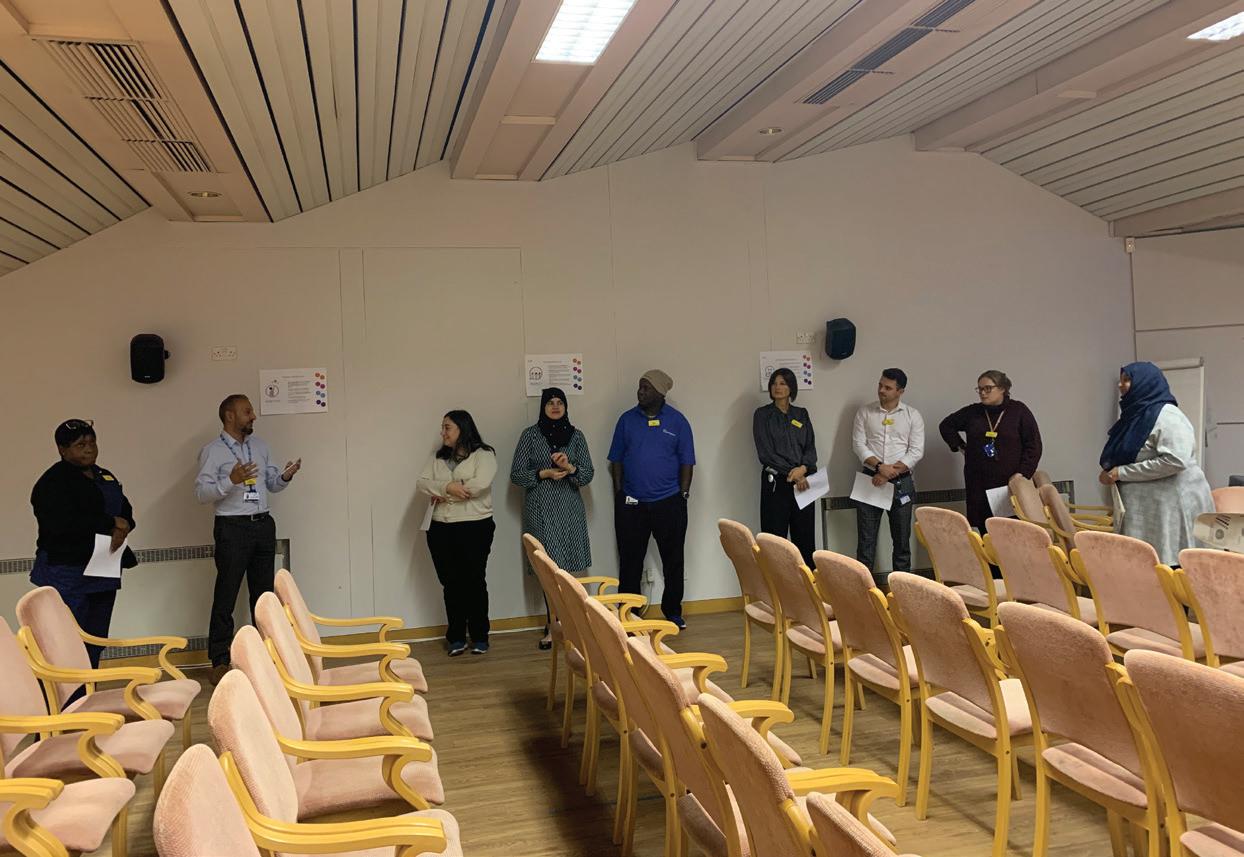

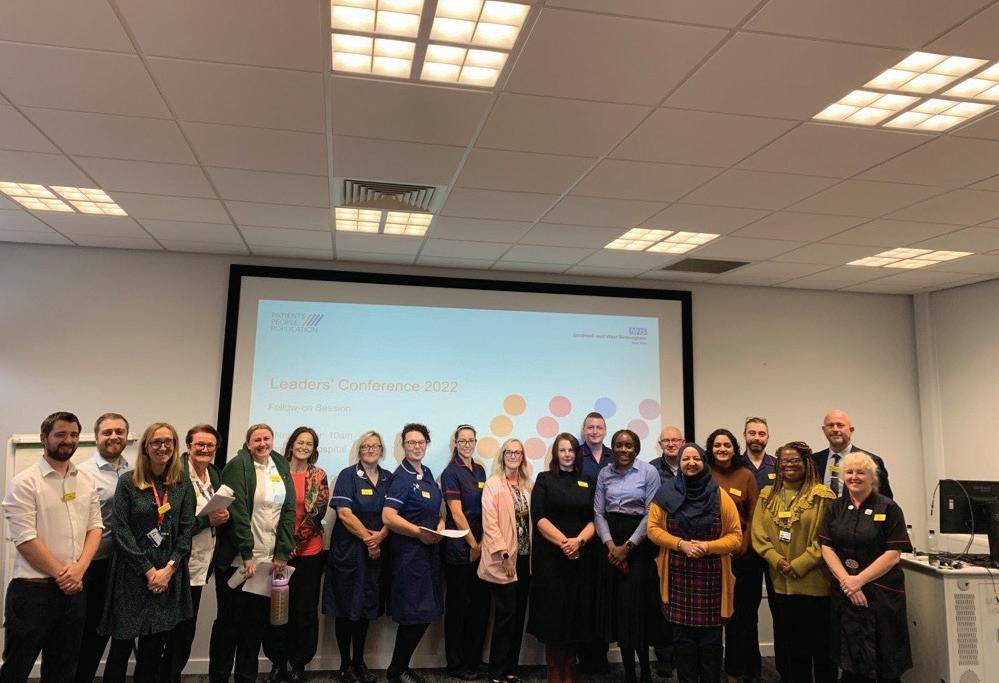
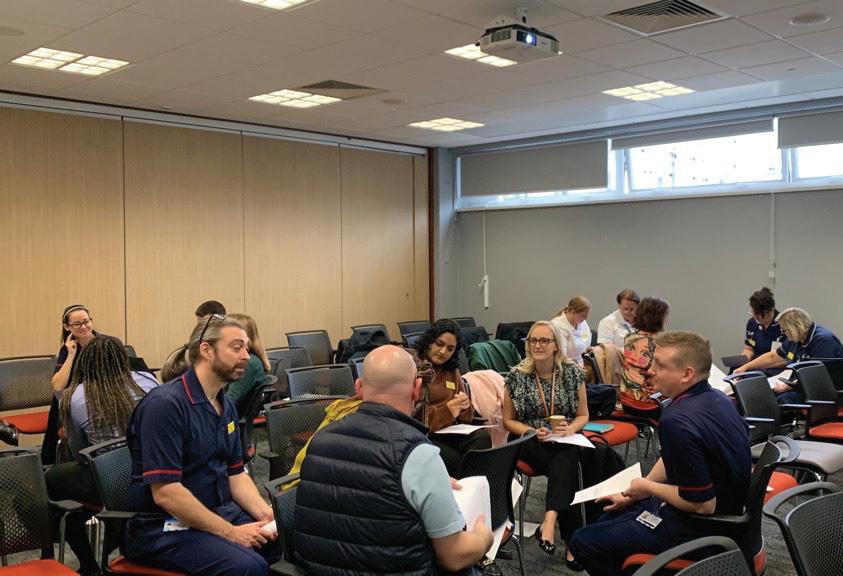
The pulse of community health, Leasowes, Rowley Regis, City Hospital, Sandwell General and the Midland Metropolitan University Hospital Issue 159 November 2022
and West Birmingham NHS Trust Delivering MMUH Pages 10-11 Our winter plans Page 14 Cultural ambassadors now in place Pages 4-5 Alcohol care team wins prestigious award Page 23
Sandwell
leadership sessions Pages 16-17 Colleagues get hands on at leadership follow-up sessions discussing how we embed our values and behaviours and steps we can take to ensure fundamentals of care for all our patients
at
HELLO
Welcome to the November edition of Heartbeat.
This month, we're marking the introduction of the cultural ambassador role into our human resources processes with a guest column from Danielle Sewell, Deputy Convenor and Cultural Ambassador.
We've also marked a number of award wins - Janice Nelson's Royal College of Nursing award, the inaugural Chief Registrar award and the alcohol care year's Nursing Times Award.
Richard's last word outlines the impact of the recent treasury budget on SWB, and you can learn more about upcoming Christmas activity in the Your Trust Charity article on page 32. Enjoy

Contact us
Communications Team
Ext 5303
swbh.comms@nhs.net
Communications Department Ground Floor, Trinity House Sandwell Hospital
Published by Communications Team Sandwell and West Birmingham Hospitals NHS Trust
Designed by Medical Illustration, Graphics Team Sandwell and West Birmingham Hospitals NHS Trust
Submit an idea
If you’d like to submit an idea for an article, contact the communications team
Ext 5303
swbh.comms@nhs.net
Stay updated
We send out a Communications Bulletin via email every day and you can now read Heartbeat articles throughout the month on Connect. Don't forget you can follow us on:
FROM THE CHAIR
Sir David talks about…our values
This month’s centrespread outlines our new values that have been shaped by you –Ambition, Respect, Compassion. They are values that we should all live up to in our daily work as we serve our patients, people and population. Alongside our values, in this edition of Heartbeat you will find a number of behaviours. The behavioural framework is a vital part of our new values. The behaviours were developed by patients, community representatives and a wide range of our staff. They are designed to be helpful examples of behaviours we want to see frequently at our Trust. We don’t expect everyone to remember them at all times, but we would like to regularly check in with them and see how well we are living up to these behaviours when we are at work.
Our Board members will be spending time next month understanding these behaviours and discussing how we will best support the values being embedded across the Trust.
Part of that will be in role modelling the behaviours and holding each other to account. We want to make sure that the decisions we make are in line with our values, but also that the way we make our decisions reflects these behaviours.
And, we want to invite you all to hold us to account. We should all feel comfortable in speaking up, and constructively and gently challenging when we think a colleague has done something in a way that is not a good example of our new values. We will commit that all challenge will be received positively and it will help us all in our journey to make this Trust a great place to work and a fantastic place to receive care.
@swbhnhs
Sir David Nicholson KCB CBE, Chair
#BeMoreVaish - celebrating the life of Dr Vaishnavi Kumar
Colleagues from across the region came together earlier this month to celebrate the life of Dr Vaishnavi Erram Kumar – a much-adored chief registrar who had won the hearts of colleagues throughout her career in the NHS.
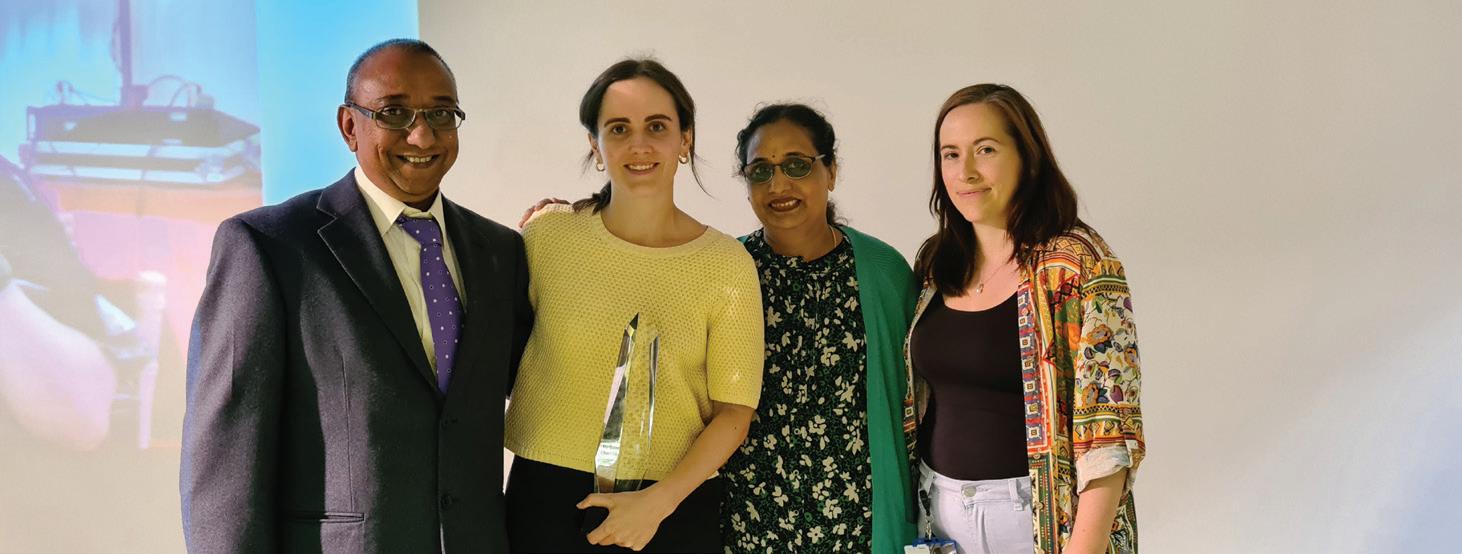
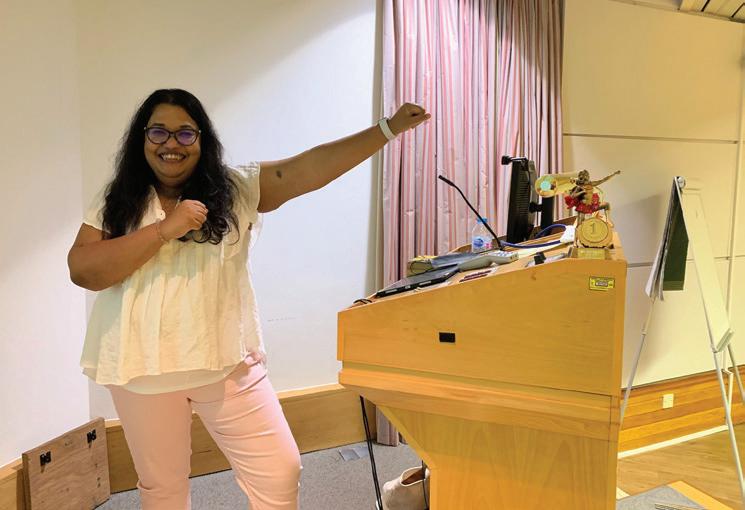
With her dedication to patient care and her ability to unite teams whilst supporting junior colleagues through one of the most challenging periods in the history of the NHS, Dr Kumar stood for all that was good in the NHS.
As a diabetes & endocrinology SpR, with a true passion and commitment for medicine, ‘Vaish’ (as she was known by colleagues) inspired those around her not simply by focussing on frontline care, but through her open and endearing attitude, championing wellbeing, women’s rights and setting a standard for her patients and colleagues.
Opening the tributes to Vaish, Deputy Medical Director, Dr Sarb Clare said, “We’re here today to remember Vaish; she will never be forgotten, she’s with us all the time, she’s part of our family. We hope that today’s memories will bring her loved ones some solace, to see that there is some light in the darkness and to remember Vaish for the person she was.”
Sharing some of her memories of Vaish, Sarb said, “I was her mentor and I’m incredibly privileged to have seen her grow, flourish and fly. As part of the Women’s Clinicians Network,
we had a day where Vaish took the lead on a debate about ‘should we remove banter from the NHS’ and she launched her ‘Banter Safety Checklist’ which challenged everyone to rethink whether banter really is acceptable. Vaish led on a leadership programme for middle grade doctors, a phenomenal 3-day programme organised by her, because she recognised she was in a privileged leadership position and could impart knowledge to colleagues. She really became a role model and an inspiration for the wider team.”
“When we visited Midland Met, whilst the rest of us were in awe of the building, the light and the space, Vaish brought us back down to earth. She reminded us that no, it’s not about the building really, it’s the people who will be in there, the vibe of the people, patients and staff who make Sandwell and City what it is, that’s what will be
within the Midland Met when it opens. “
“Throughout the memorial colleagues took to the stage to share their memories of Vaish, from the junior doctors she supported, the diabetes team she worked alongside and the registrars she led. In her time at the Trust she had a huge impact on an incredible number of people all of whom shared the same promise: they would be ‘More Vaish’.
Closing the memorial service, Vaish’s father Dr Ravi Kumar took to the stage, sharing his thoughts he said, “It is a privilege to have met with you all. Thank you for sharing the special moments you had with my daughter, it has provided me and my wife with much needed peace and solace.
“Whilst the pain of her passing away remains, Vaishnavi’s passing away should not be remembered with negativity and sadness. I ask you all to remember her for her meticulously done makeup, her red lipstick and her ever shining smile which would light up any space she was in. Remember her for her warmth, her sense of humour, her fun-loving nature, her empathy and compassion and her passion for medicine, diabetes and endocrinology.”
Stephanie presented with inaugural Chief Registrar Award
Dr Vaishnavi Kumar was known across our Trust as a compassionate and caring chief registrar who always put her patients, colleagues and those around her first. With her passion for care, courage and tenacity to lead, she quickly became a leading light for junior doctors so with her passing, it was clear that what she stood for should be honoured and celebrated.
The Dr Vaishnavi Kumar Chief Registrar Award will be an annual accolade presented to a junior doctor who demonstrates the leadership qualities and behaviours of what a doctor should be - caring, kind and empathic all whilst striving to give the best high quality care at all times. It will be awarded to remember what Vaish symbolised. The chief registrar, alongside the wellbeing committee, will be
responsible for choosing the recipient and submissions can be made from across the UK and Ireland.
This year's inaugural award was awarded to Dr Stephanie Wallis, Internal Medicine Trainee who is astute, compassionate and
works to a very high standard and someone whom the team saw a future registrar within. She always thinks laterally, is eager to learn and a team player. Stephanie worked very closely with and was mentored by Vaish which makes the award very poignant.
3 CORPORATE AND GENERAL NEWS
Dr Vaishnavi Erram Kumar
Dr Stephanie Wallis is presented with the Inaugural Chief Registrar Award
Celebrate
Cultural ambassadors introduced to identify and challenge discrimination and cultural bias within the Trust
On 7 November 2022 SWB formally introduced the cultural ambassador role into the disciplinary processes, as part of our commitment to eradicate discrimination and ensure all colleagues are treated with fairness, dignity and respect. Fourteen colleagues have been trained as cultural ambassadors to identify and challenge discrimination and cultural bias. They use these skills in their role as a neutral observer within disciplinary processes, formal investigations and grievance hearings for colleagues.
To explain the purpose and value of the role, we reached out to Danielle Sewell, Deputy Convenor, Specialist Podiatrist and Cultural Ambassador.

My name is Danielle and I am the Deputy Convenor, Specialist Podiatrist and a Cultural Ambassador for our Trust. I represent the Royal College of Podiatry as a Workplace Steward and Health and Safety officer.
My experience through Sandwell and West Birmingham has been slightly varied. I entered as a specialist podiatrist and, whilst I am still a clinician, most recently I have been in full time trade unionist mode, first as policy lead and now as deputy convenor.
My journey on staff side began in about 2019: their primary function is to provide the collective voice of the 14 unions that are recognised within SWB. It has provided a deeper insight into what occurs behind the scenes in terms of staff and allows representatives such as me to raise concerns on behalf of the members at a Trust-wide level.
We have access to some important information, including the number of formal investigations and the wait times for colleagues. This is where the cultural ambassadors come in.
Within the NHS we have the Workplace Race Equality Standard (WRES), a national reporting
4
Danielle Sewell
system for issues and themes on race. Black, brown and minority ethnic colleagues may or may not be comfortable sharing, but I am able to state that experiences through the workplace are different from our white colleagues. On a surface level it might look the same, but the struggle is real.
The WRES data reports that within 50 per cent of the NHS Trusts across the UK, black, brown and minority ethnic staff are 1.2 times more likely to enter a formal disciplinary process than our white colleagues. It might seem like a small number, but let’s get specific: the data are stating that people that look like me may be faced with a disciplinary for something white colleagues may not receive any reprimand for.
Within our own WRES data (correct as of August 2022) the number of white colleagues entering the formal investigation process was 16.3 per cent, compared to 37.2 per cent of black, brown and minority ethnic staff members. More worryingly, a further 53.5 per cent chose not to declare their ethnicity. This may result in greater figures for black, brown and minority ethnic staff if the undeclared category were unpicked and categorised.
This does not mean that in every case disciplinary may not result for a valid reason, but the reduction in formal cases reported by trusts currently using cultural ambassadors means that sometimes black and brown staff are treated more harshly for trivial incidences. In many cases, the triggering of the investigation process is unwarranted and the initial cause of the disciplinary may be rooted in racism or bias - unconscious or otherwise.
The cultural ambassadors are part of the disciplinary process as equal panel members, who will listen, voice concerns if they notice bias, ask questions, and respectfully challenge
other panel members on this premise. The role is essential in changing the culture of the organisation and the need to speak up for the underrepresented – hence the name.
Some of the biases that black, brown and minority ethnic staff may experience are micro-aggressions. Micro aggressions are unwarranted comments, thoughts and behaviours that are projected towards a minoritized person. One example is the “angry black woman” trope, sometimes employed when a black woman is expressive and uses their voice within the workplace. You may not feel it’s appropriate or that you’re within a psychologically safe space to challenge at the time because you may find you’ll be told, “you’re too sensitive,” or even worse, “you’re playing the race card.” It’s usually micro in nature but macro in terms of the physiological response of the person on the receiving end of the comment or behaviour.
The simplest way to depict this is in terms of mosquito bites. One or two may be manageable, but several, on a daily basis, can manifest into stress, anxiety, poor productivity and performance. I can tell you as a black woman navigating within this system and fighting to get this programme off the ground: I am tired! It can be a difficult thing to explain to those who are not affected, but maintaining the status quo and failing to recognise the damage caused to your colleagues demonstrates a lack of care and ensures that the system remains institutionally racist. The data on the disproportionate outcomes is
there. It is happening, and we need to respond differently to an identified group of people to obtain a better outcome for them and for us as an organisation.
Whilst cultural ambassadors are not providing individual support to black, brown and minority ethnic staff, we are in support of the Trust’s processes and holding the organisation to account to provide equity. We are not taking the place of the union rep as they are responsible for individual support around terms and conditions and workplace issues. We are simply focused on maintaining a fair and stable process and the need to identify and remove any bias that may be uncovered within an investigation.
Richard Beeken will assure you that "People" is one of our strategic objectives for the next five years and cultural ambassadors are an investment to widen our inclusivity element. We want to make you feel welcome, retain you and make the Trust a better place for you to work, honouring the trust values of ambition, respect and compassion.
I’m hoping that this is just the start to a continued process of improvement within our working environment.
This year’s Black History Month theme was “Time for Change: Action Not Words.” Therefore, in honour of an amazing Black female ancestor, Maya Angelou:
“Do the best that you can until you know better. Then, when you know better, do better!”
Further reading:
https://www.england.nhs.uk/wp-content/uploads/2022/04/Workforce-Race-EqualityStandard-report-2021-.pdf 2. https://youtu.be/hDd3bzA7450 5
1.
Black History Month celebration
achievements and knowledge of BHM.
To commemorate the annual celebration, the Postgraduate Centre at City Hospital played host to a special Black History event sponsored by Unison on Friday 28 September.
Local black-owned businesses were invited to host an array of stalls selling their goods, for colleagues to visit and buy throughout the event, including homeware, celebration cards, accessories, clothing, cakes and many more.
Last month marked Black History Month (BHM), which began as an effort by Carter G.Woodson to recognise the valuable contribution made by people of African origin and was formally adopted into the UK in 1987.
People from African and Caribbean backgrounds have been a fundamental part of British history for centuries; however, many believe their value and contribution to society is often overlooked, ignored or distorted. With this in mind, the awareness month aims to recognise and celebrate black history.
Throughout October, the Trust aimed to capture, educate and share positive
Many guest speakers were in attendance including Richard Beeken, Chief Executive, who said: “We (staff) need to look at black history and black future through the lens of our Trust’s three strategic objectives and new values.
“We were given two ears and one mouth for a reason – unless we listen more to the needs and expectations of different cultures, from those who use our service, or those who care for them, then we’re in great danger.
“Let’s listen more about people’s heritage, people’s expectations, people’s needs and project less our own biases, opinions and interpretations.”
The Trust’s catering department dished up popular Caribbean foods for attendees to try, which turned out to be a huge hit.
Ray Downie, Unison Branch Secretary and Steward, said: “It was a pleasure to organise the BHM event for the Trust this year.
“The aim of the day was to educate people on what BHM really means for black colleagues here at our Trust – and to give them a chance to share their experiences to help teach others.
“I am really pleased with the turnout we had, it was great to see people interacting and starting a conversation that needs to be had. I hope these conversations will continue and reflect what we have learnt.”
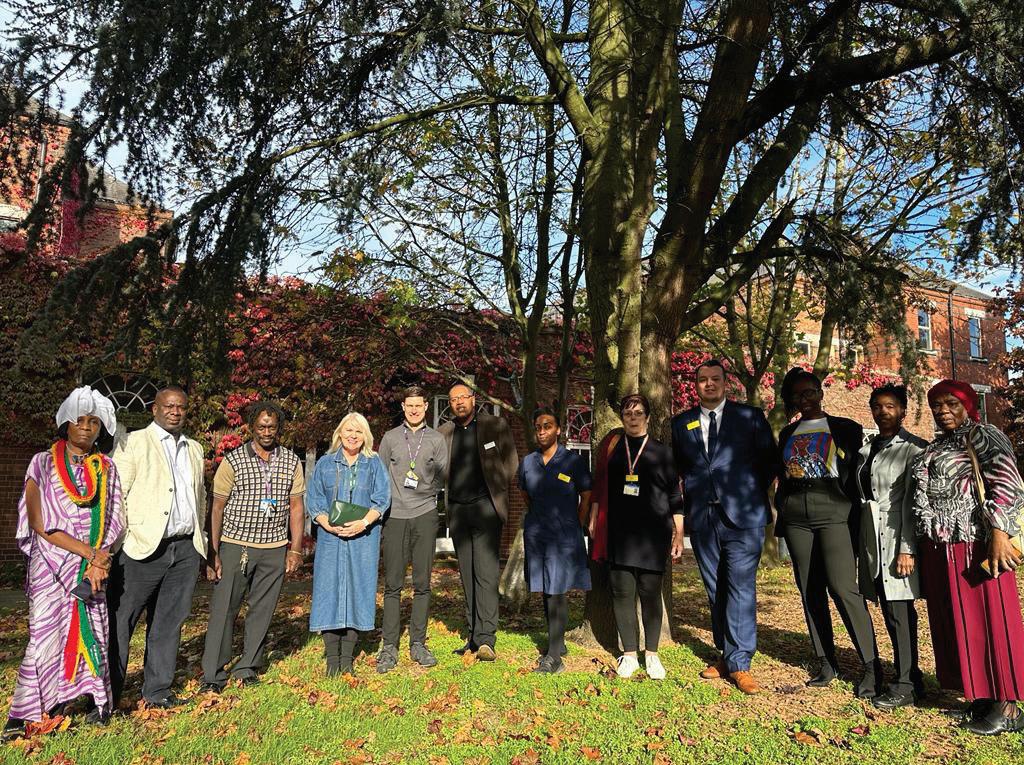
6
Colleagues at the Black History Month event
AND GENERAL
CORPORATE
NEWS
Janice scoops top award from RCN
three-year plan that aims to improve EDI throughout the supply chain.
Janice took on the role in 2021.
Clare Nash, Head of Clinical Products Management, said: “I am extremely proud to have Janice in my team. She is very deserving of this award as she always approaches her role with a spirit of excellence, and ensures equality, diversity and inclusion are at the heart of everything we do in procurement.”
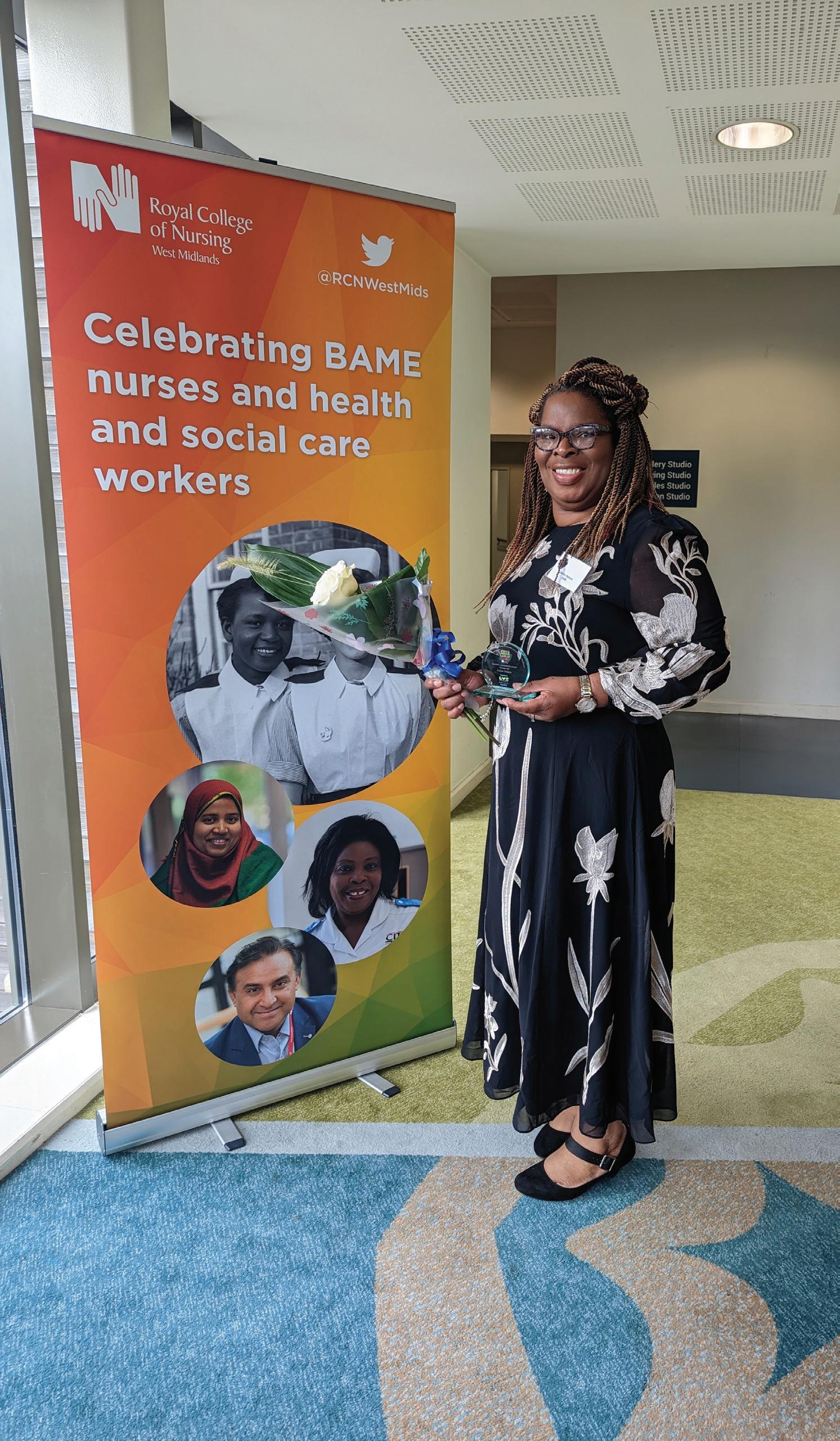
Explaining more about the Janice’s role, Clare added: “To the best of our knowledge, the role is the first of its kind in our region, and therefore Janice had to set the ambition for our service with a blank sheet of paper.
“Janice has implemented an EDI procurement strategy which set the aims, outcomes and key metrics for the next three years. As a result, our team are delivering improved EDI and social value outcomes, increasing BAME opportunity to access NHS spend. She has showcased her approach at the ‘ICS meet the buyer’ event, engaging with small and medium enterprise (SME) businesses, supporting them to access contracts within the NHS.
“She captures supplier diversity information, and EDI questions are now issued with all tenders. Results form part of the scoring process to ensure we place added value on SMEs that reflect our EDI principles.”
Janice also works alongside the Black Country Chamber of Commerce, understanding the barriers SMEs and organisations owned by BAME people may have in accessing NHS contracts. The aim is to spend more NHS money locally, adding further to the social value aspect of our NHS Trusts as anchor institutions.
Clare added: “As part of her clinical procurement role, she ensures clinical product evaluations include as many staff or patients with protected characteristics to ensure what we buy truly meets the needs of everyone.
“Through her EDI work, Janice has significantly improved our score in the Talent Inclusion and Diversity Evaluation (TIDE) assessment giving fair and equal opportunity to all.”
Janice said of her achievement: “I am proud to receive this award and recognition from the RCN. As a team, we will continue to make a difference for our patients, staff and suppliers.”
The procurement team have been celebrating after equality, diversity and inclusion champion Janice Nelson scooped a prestigious national award. Picking up the Royal College of Nursing’s
Black History Month “Making a Difference” award, Janice was recognised for her excellent work championing equality, diversity and inclusion (EDI) within the procurement and finance department and has developed a
Janice Nelson with her award
7
Cancer hotline launched offering expert advice for concerned patients
We have now launched a cancer hotline offering advice for residents with a Sandwell GP who are worried they may have symptoms of cancer.
Concerned patients will be able to speak to a specialist nurse who can discuss their symptoms and offer advice on the next steps to take. They must be registered with a Sandwell GP.
This one-year pilot service has been funded by the West Midlands Cancer Alliance. It has been set up in partnership with our Trust and Healthier Futures Black Country Integrated Care System (ICS).
Jenny Donovan, Cancer Services Manager, said: “This hotline will mean people who are concerned about new or persistent symptoms that could be a sign of cancer can speak quickly to an expert. We want
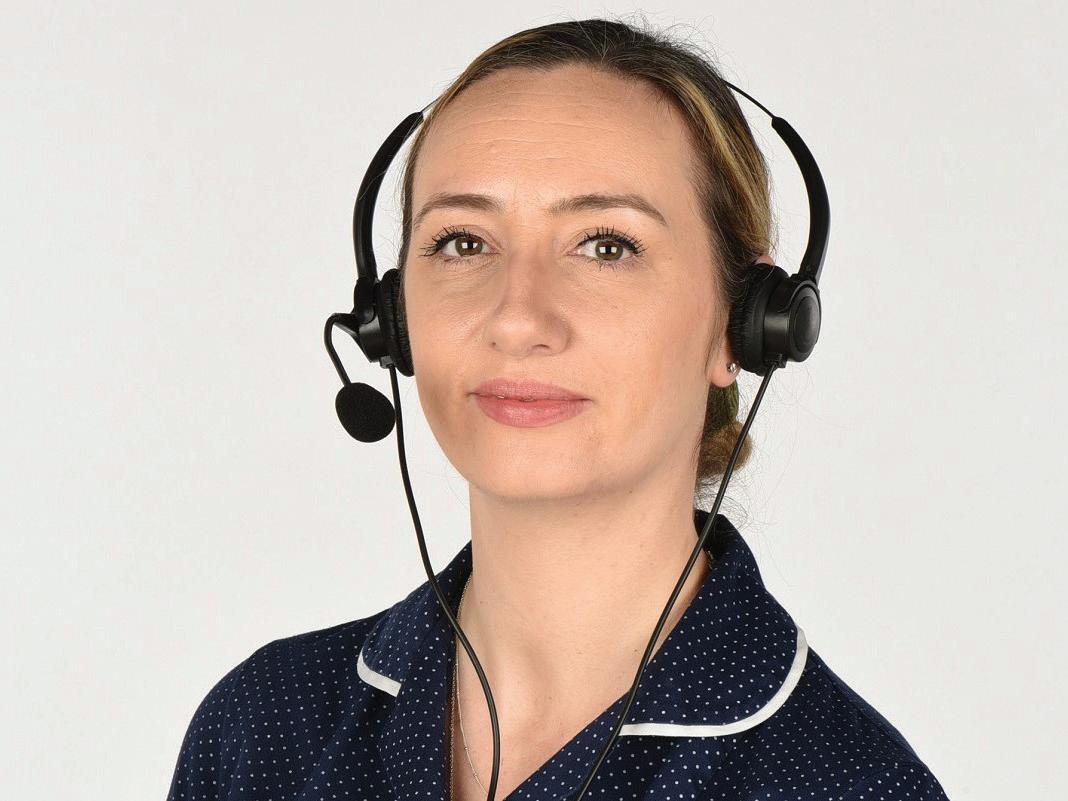
to make sure that they have the tests they may need, and any treatment required as quickly as possible.
“Anyone who is worried can ring the advice line on 0121 507 3330, Monday to Friday, between 8am and 4pm.”
Jenny added: “If they think that the person doesn’t need to see a specialist or have tests, they
may recommend the person contacts their GP.” Symptoms of cancer include unexplained weight loss, unusual swellings or lumps, changes to a mole, blood in wee or poo, changes in bowel habits for more than six weeks, a hoarse voice for more than three weeks, difficulties in swallowing, unusual changes to your breasts and vaginal bleeding after menopause or between periods. For more information, please visit www.nhs.uk/ conditions/cancer/symptoms/.
Belinda Dooley, Head of West Midlands Cancer Alliance, said: “It is really important that people don’t delay seeking help. If you call our specialist nurses, they can offer reassurance and make sure people are getting the help and support they need, as soon as possible.”
The NHS Long Term Plan aims to save thousands more lives each year by dramatically improving how we diagnose and treat cancer –our ambition is that by 2028, an extra 55,000 people each year will survive for five years or more following their cancer diagnosis.
D11 putting an end to pressure sores and patient falls
D11, one of our elderly care and stroke wards at City Hospital has been setting the standard for patient safety over the last few months with a significant drop in patients developing pressure sores or patient falls – even achieving full month of absolutely no falls or pressure sores during the month of July.
“Being able to say that we are not only improving patient safety but achieving periods of absolutely no patient falls or pressure sores is an amazing achievement. D11 is an elderly care ward which means falls are a more likely occurrence and in the past D11 has had some levels of slip, trips and falls as many of our patients require focussed care and are unsteady due to their age or illness” said Joy Walker, Senior Ward Sister.
“What makes this achievement great is that during this period of improvement, the ward was at full capacity for the majority of the time as our bed bays were consistently full.”
Patient safety is priority within any nursing team including D11 and that the leadership, setting the standards and expectations is paramount within a team to provide excellent safe patient care.
Jo Thomas, Matron for Elderly Care, believes this is one of main reasons why ward D11 reached this goal.
She said: “The art of good communication within safety huddles provided by the senior leadership team is an important factor when discussing patient safe care, which can be attributed to us achieving 100 per cent falls and sores free months.”
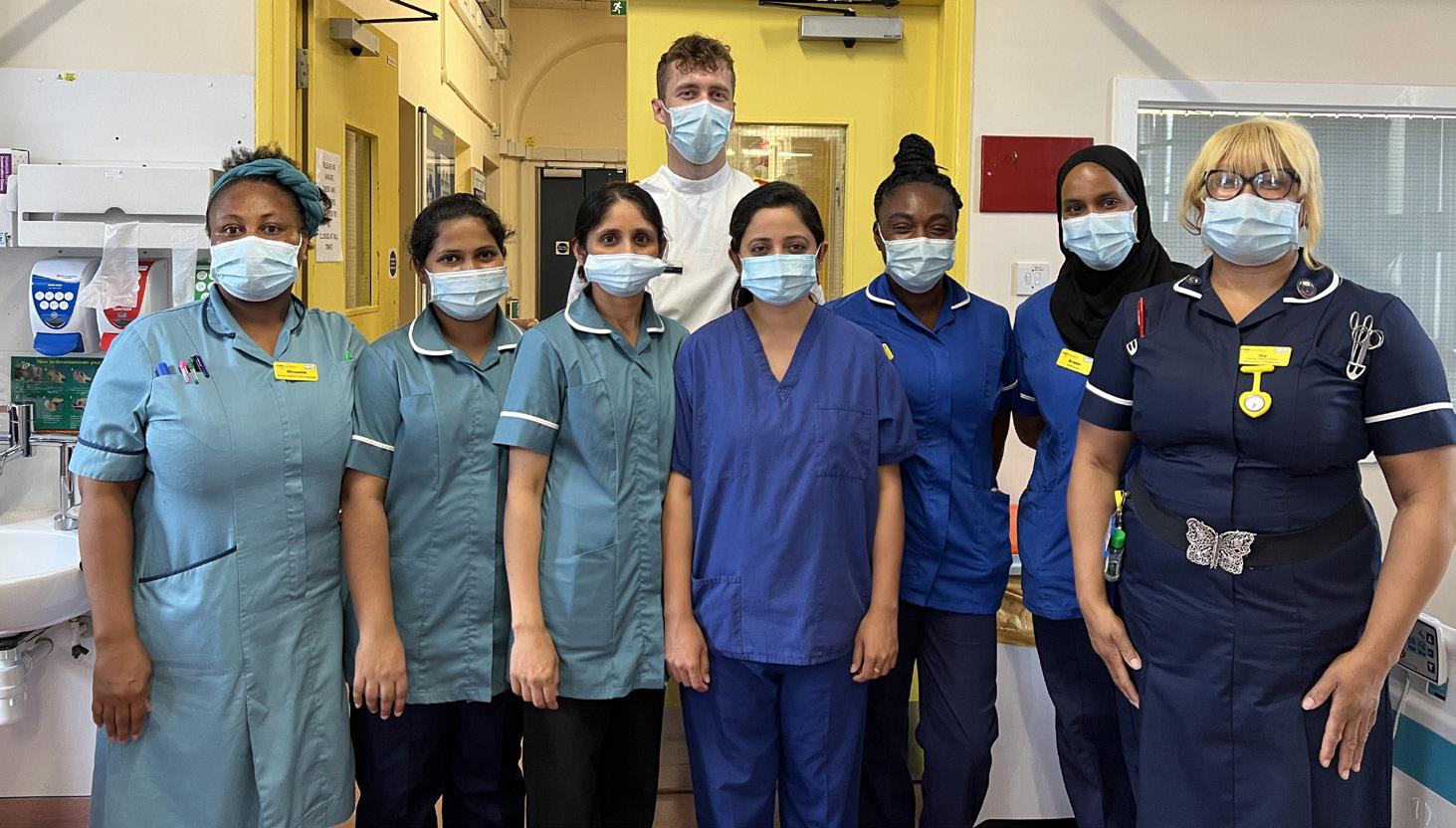
This quality of care wasn’t attained by accident on D11, as the ward have been completing ward training and refreshers on a regular basis, with the emphasis on care and teamwork.
When asked about how she feels about reaching 100 per cent Joy said, “I feel proud of all the staff on the ward as they always try their best to maintain quality, safety and the highest level of care.”
She added: “Although we achieved 100 per cent, the team must not become complacent but instead continue to drive up the standards across the ward.”
Well done D11 ward - keep up the fantastic work!
8
CORPORATE AND GENERAL NEWS
Grace Preece is leading the team within the new cancer hotline service
D11 celebrate a significant drop in patient falls and pressure ulcers
New chief registrar comes ‘home’
Local girl Dr Laura Pearson took up the position of chief registrar in September, and speaking to Heartbeat she explained why it felt like coming home.
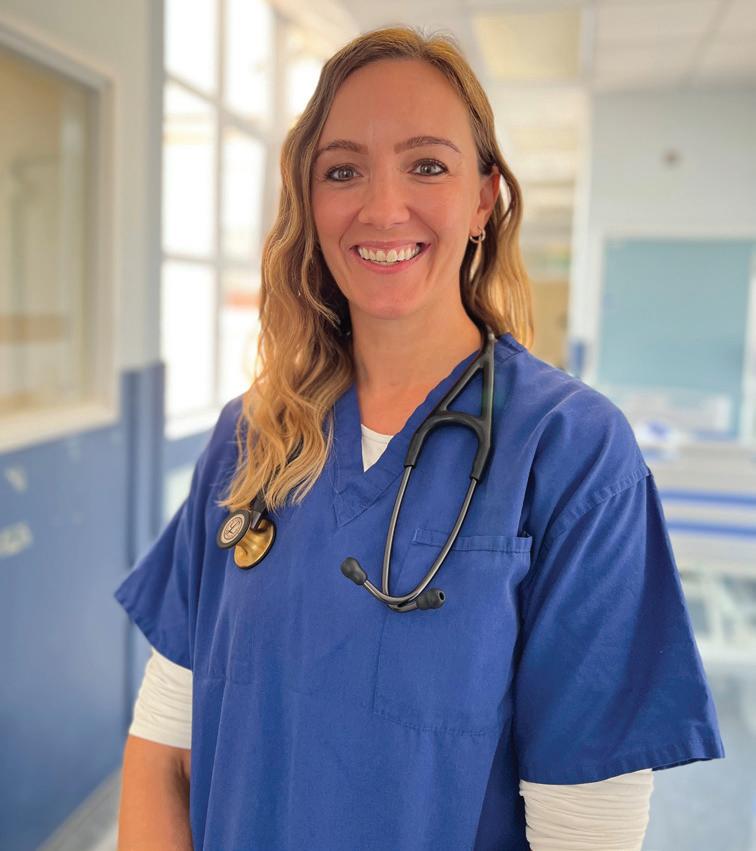
“I was pleased to be appointed chief registrar for SWB, as I have a very soft spot for the Trust gained through different periods working here. Initially I started in 2009 as an FY1 (Foundation Year One doctor) at Sandwell, was a SHO (Senior House Officer) at City in 2012-13 and have done some of my registrar training here. Although I am new to the Trust in this role, I feel like I’ve come home, for even as I walk down the corridor there is always someone saying hello. It is a really warm and friendly place to work. What stands out is that senior colleagues treat you as their equal; they really care and support you and that is important when you are starting out in your career.
It was a serious riding accident when she was 12 that helped Laura find her calling in medicine as she recovered from a broken back in hospital. She explained: “I was really interested in what was going on around me in hospital and was in awe of the work that the medical staff were doing. I felt drawn to a career where I could help people.
“After choosing medicine I knew I wanted a speciality where I could engage with my
patients and look at them as a whole, rather than focusing on one symptom or diagnosis. As an elderly care registrar, I am able to realise my ambition to care holistically about patients and have difficult conversations compassionately. As a geriatrician we are not just treating one illness but looking at the whole picture and the care going forwards – looking at the whole patient.”
Laura is keen that her experience and insight helps inspire colleagues as she makes wellbeing a priority. “One thing I hope that my experience of
working here during my training brings to my role is a real insight. My experience of working at other Trusts - especially during the pandemic - has shown me that SWB has one of the best approaches to wellbeing for junior doctors, and that is not solely my own view but is echoed by other junior doctors I have talked with. I feel passionately about it, and I hope that I can be part of making it even better.
“I think the communication about our wellbeing support is very well done and it is very well publicised, keeping it at the front of everyone’s minds. And, our peer support sessions facilitated by Mike Blaber, along with other senior colleagues including Huma Naqvi and Anna Lock, are very well done.
“As a new mum and working less than full time I hope I can be an example to others, showing that it is possible to be in a leadership position whilst also having a young family. I feel passionately about the wellbeing of colleagues and would encourage them to contact me if there is anything more we can do.”
Colleagues who would like to contact Laura can do so through swbh.chief-reg@nhs.net.
Lee drives improvements in mental health practice
The need to improve mental health provisions in the NHS has been a longstanding and well-known issue, with increasing numbers of patients needing specialist mental health support and the fallout from the COVID-19 pandemic leading to increasing levels of stress, anxiety and mental health crisis in the community. In response to this local and national position, the appointment of a new mental health lead is set to change this for patients at our Trust.
Leading the charge is Lee Hurst, the newly appointed mental health lead for our Trust. Heartbeat spoke to Lee to find out more about the new role and the challenges he is set to tackle, he said, “I have taken up a unique secondment opportunity, developed in partnership with Black Country Healthcare NHS Foundation Trust and Sandwell and West Birmingham NHS Trust. My role focusses on providing mental
health expertise and to help lead work on key priorities that support delivering the Trusts vision of improving access to mental health care and support across all core services within the Trust for patients of all ages.
“It is hoped that my role will help drive standards of mental health practice across
acute care pathways, leading development of a mental health quality framework, review of acute patient pathways and policies, within an acute hospital context. As this is a seconded role, I am hopeful that I can influence change and improving services for patients through collaborative approaches, working beyond organisational boundaries.”
First on the agenda for Lee as he steps in to his role is to help support the mental health assurance group, and lead steering groups that report into the assurance group. This framework will help ensure high quality care for patients with mental health disorders who are treated at SWB.
If you feel that you need support and advice related to patients with a Mental Health need or for more information on the opportunities available contact Lee Hurst on tel: 07977145610 email: leehurst@nhs.net.
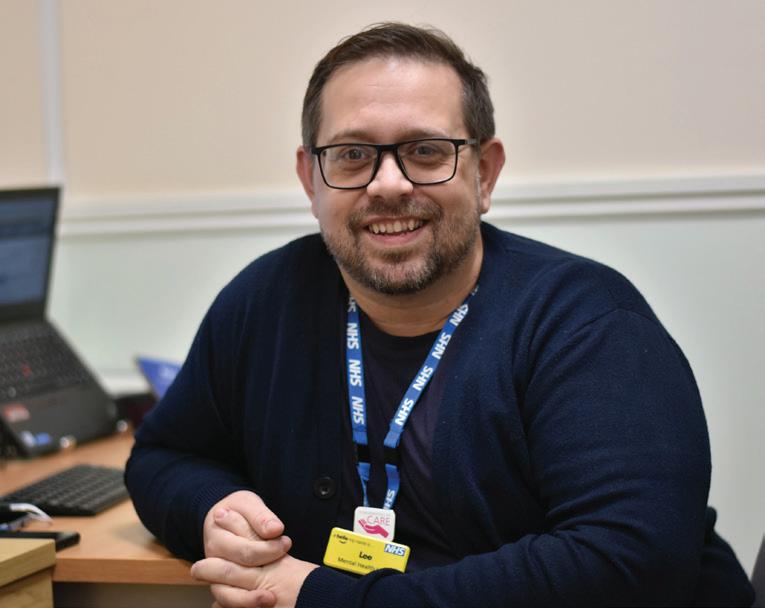
9
Dr Laura Pearson
AND GENERAL NEWS
CORPORATE
Lee Hurst
Delivering MMUH the new company

Midland Met brings together all acute services onto a single site. The services provided at our current hospital sites will change significantly – from including acute and emergency care services, to being treatment centres providing day case surgery, routine diagnostics and outpatient appointment clinics. Sandwell will house a 24/7 urgent treatment centre, with a further urgent treatment centre planned for the Midland Met site in 2024.
We have always been clear that Midland Met is #morethanahospital. It is a catalyst for change for our local communities. It is also the biggest lever we have to improve the quality of care for our patients. It has to be so much more than a relocation.
A whole range of clinical pathways need to be changed to ensure that patients receive safe and seamless care when we open. For some services it means bringing together multiple teams for the first time. For others, new services will be created or adapted in
the community to ensure that Midland Met is the right size to meet everyone’s needs.
The Midland Metropolitan Programme Company is bringing together all those people who have a significant role in delivering Midland Met. It includes some new leadership roles, creating more capacity to do the significant work required for Midland Met, whilst we stay on track with delivery of our Trust’s three strategic objectives (the three Ps) combined with work through our two “places” (Sandwell & Ladywood and Perry Barr) and our two “systems” (The Black Country and Birmingham & Solihull). We certainly have a lot going on over the next four years and our patients deserve our focus - both on staying with our core strategy and delivering the benefits of a new hospital. We will appoint a Managing Director (from within the executive team) to support internal, day to day leadership of our core organisation and a Managing Director for the MMUH Programme Company.
1. Why is a new virtual organisation necessary?
The establishment of a new programme company is international best practice for significant programmes such as ours. We are following guidance from the independent Major Projects Authority which works with HM Treasury and government to provide independent assurance on major projects. The approach also has the full support of the Department of Health. Our Trust has significant challenges ahead with an ambitious five-year strategy that must not be lost sight of. We are also among a minority of Trusts who are part of two integrated care systems and are required to work with partners in two distinct places. These factors combined with the challenges facing health and care service nationwide mean we need to create for ourselves the best infrastructure to be successful at Midland Met and at our core programme of work.
10
In order to prepare for the new hospital, our organisation is in the process of establishing a new ‘virtual’ organisation (The Midland Metropolitan Programme Company) to lead the significant change that is required.
MMUH – introducing company
2. Is this a private company?
No, it is a virtual organisation. Colleagues will retain the employment of the Trust and associated NHS terms and conditions. MMUH Programme Company sits within the Trust’s governance structures but will have more delegated authority to make decisions quickly in order to get the programme delivered.
3. Are there new jobs in the virtual organisation?
There are a few new roles that are being created to help lead the programme and get ready to move safely into the new hospital but many roles are already in existence. Some roles will be full-time and other roles will be hybrid with people spending part of their working week dedicated to the MMUH programme.
4. How are people appointed into roles in the virtual organisation?
Management of change processes are in place for all appointments to the
MMUH programme company. These include assessment over existing roles and responsibilities along open engagement with colleagues for whom a change in role or reporting arrangements is required.
5. Is this all costing the Trust a lot more money?
Our costs for the new organisation are funded externally and we are not diverting funds from existing Trust budgets to pay for any new roles.
6. What happens when Midland Met opens?
We expect the new MMUH Programme Company to be in place no longer than six months following the opening of the building. This will give an opportunity to ensure that the new hospital works effectively, and is enabling us to continue realising the benefits set out in the MMUH business case. The MMUH Programme Company will hand over new ways of working and the continuation of benefits realisation and ongoing transformation to the core organisation. The new or adapted
roles that form the MMUH Programme Company will be for a limited time period only.
7. How does the Trust ensure that it doesn’t lose sight of the progress towards Midland Met?
In setting up the new MMUH Programme Company we have established a clear governance structure so that the Board retains oversight of both the Trust’s core business and its progress in delivering the new hospital. In the next year the MMUH Programme Company team will be engaging all clinical and non-clinical teams, as well as public and partner organisations, to ensure we are ready to support the first patients moving into Midland Met.
Midland Met is a once in a career opportunity to dramatically change healthcare for our Patients, our People and our Population. We need to seize this opportunity to make MMUH the success we know it can be, whilst retaining our focus on improving care, building strong partnerships and making SWB a great place to work.
If you have heard any rumours about the Midland Met and you want to know if there is any truth to them, however far-fetched, intriguing or interesting, email the communications team at swbh.comms@nhs.net for an answer.

11 11
NEWS
Sandwell and West Birmingham NHS Trust
Bringing same day emergency care to life at Midland Met
As we gear up to open in 2024, much focus is now on how we deliver care. Ensuring that we offer the most patient-focused care is not a small task. Currently, teams are reviewing their processes to ensure we provide the most appropriate care at the right time, in the right place and perhaps most importantly, at the right time for patients.
This is where Midland Met will come into its own as our acute hospital. Teams across SWB are transforming care pathways which will enable patients to see the most appropriate medical professionals on arrival at Midland Met. The way we will triage patients at the front door is going to be different and same day emergency care (SDEC) will help us deliver on our ambition to provide the right care, in the right place, at the right time for patients.
SDEC focuses on same day care for emergency patients who would otherwise be admitted into hospital. Under this care model, patients presenting at the hospital will be assessed, diagnosed and treated without being admitted to a ward where possible. As Midland Met will focus on acute care, the main difference with SDEC is that patients will go home the same day if it is clinically safe for them to do so.
How a patient arrives at our SDEC unit may be via a variety of routes, including a GP referral, West Midlands Ambulance Service or by being triaged on arrival at Midland Met. This new way of working will ensure we adopt a consistent approach to care and help to improve the patient experience whilst reducing hospital admissions.
Dr Sarb Clare, Deputy Medical Director, told us: “I am one of the Trust SDEC leads along with my colleagues Sajan Sathyan, Director of Advanced Practice and Andy Wilkinson, Assistant Director of Operations.
“We recently took advantage of the opportunity to visit Midland Met to view our SDEC areas to see how it’s developing to feed into our teams. It also helps to inform our current work. SDEC is a top priority for the Trust and covers medicine, surgery, gynaecology and paediatrics. The aim is to get our patients to the right place the first time by avoiding the ED.
“Our SDEC work is gaining momentum, and our roles are essential to provide support and a helicopter view to avoid duplication and share learning. Our current aims focus on data recording, streaming from the front door and ensuring equitable access to diagnostics.
“Medical SDEC is currently operating on
two sites which gives us challenges in terms of workforce, capacity, resources and environment. Midland Met will bring the teams together on one site, which will help to strengthen how we work and improve collaboration.”
Dr Clare added: “It was heartening for us to see Midland Met coming to life and enables us as leaders to see the vision becoming a reality.”
Sajan Sathyan, Director of Advanced Practice, remarked: “We were thrilled to have the opportunity to visit the new hospital site that will provide patients and staff with state-of-the-art facilities.
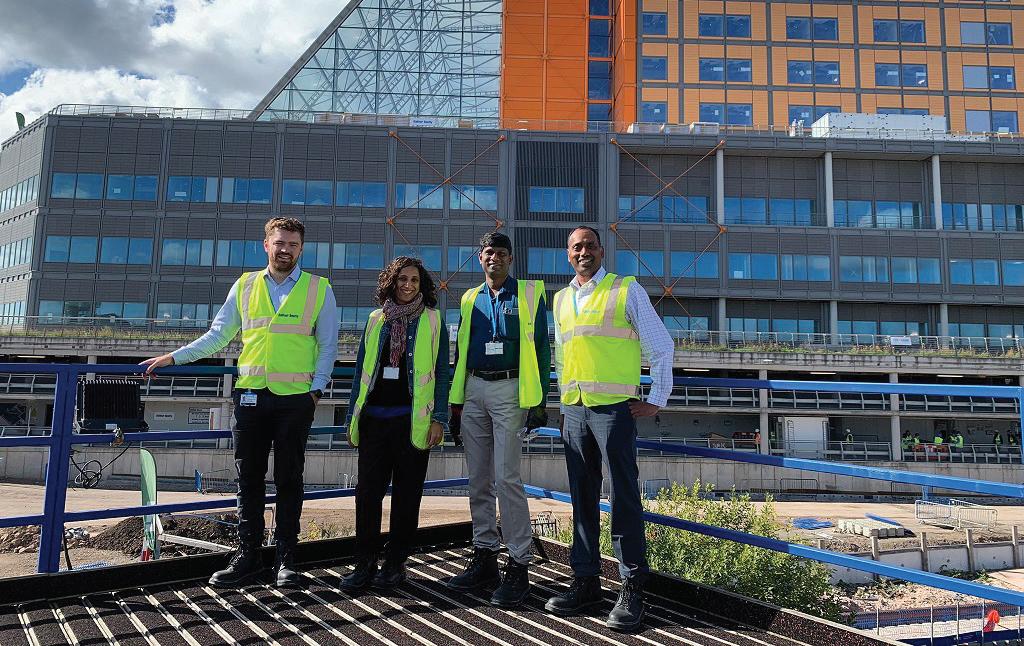
“We were impressed with the co-location of the emergency department and the assessment areas, which will ensure people get the right care when and where they need it. It will be a game changer for SWB – having the ability, facilities, and teams working together to assess, diagnose and treat patients where possible on the same day will help us to enhance the patient journey and reduce lengthy hospital stays.”
Andy Wilkinson, Assistant Director of Operations, told us: “It’s inspiring to see how the site has continued to develop. It really puts into perspective the opportunities that it will bring in transforming the patient care we deliver.”
SDEC leads enjoyed a tour of Midland Met to help inform their work and to feedback on progress to colleagues in their areas.
12
How long have you been at SWB and what is your current role?
I am a senior improvement project manager working in the improvement team and I have worked here for eight years.
What part does your role contribute to the Midland Met project?
I am the senior project manager on the ward standardisation project. The focus of this project is to have a standard way of working across all our wards (i.e., ward rounds and ward handovers).
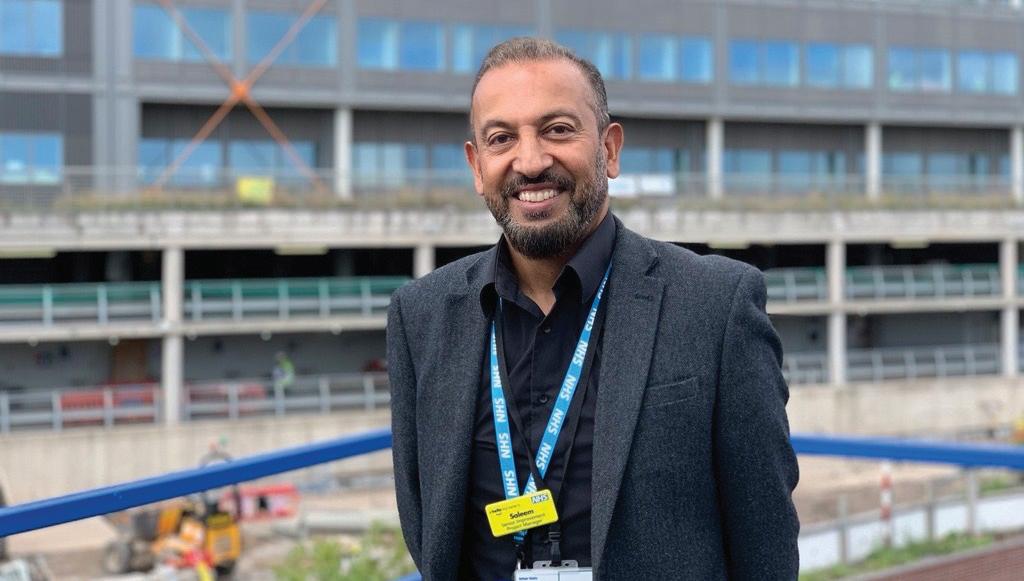
Being the project lead for hospital standardisation and seven day working on our new acute care transformation involves engaging with all the teams in our Trust on how and what we can do to standardise our working practices across the organisation.
My part in Midland Met
We will take a multidisciplinary approach that requires each of us to be involved in the decision-making process. The Trust will host several workshops in the coming months, so please get involved.
How are you preparing for the opening of Midland Met in your team/ department?
The improvement team is currently up skilling team members. This is so they can meet the demand for the continuous quality improvement support required by teams when Midland Met opens.
In what ways will our new hospital help to shape your role for the better?

My role will support and coach continuous quality improvements in all areas and services that Midland Met will provide. This
Community engagement steps up at Midland Met
In preparation for our move to Midland Met, engagement with community groups, councillors, faith-based groups, patients and carers has stepped up to ensure our plans have the full support from our stakeholders – helping aid with a smooth launch of Midland Met. Recently, we welcomed members of the Sandwell Overview and Scrutiny Committee (OSC) to Midland Met to see the progress on the new hospital and share our plans, including the clinical care models we will adopt, how we will reconfigure our estate and regeneration plans for the region.
The development of Midland Met is of particular interest to the OSC as they focus on improving services across Sandwell, such as carrying out reviews of services or policies. We caught up with Jayne SalterScott, Head of Public and Community Engagement, to find out more.
“The Trust and commissioners have been talking to the Oversight and Scrutiny Committee about Midland Met over several years. Every reconfiguration and consolidation that has required a public conversation has been through the committee.
“Each local authority has a scrutiny function, and there is a joint scrutiny function across Sandwell and West Birmingham. Councillors who are the council’s executive can play an influential role in shaping policy and decisions that will have a real benefit on behalf of the communities they represent, and this includes healthcare providers.”
As the group made their way around the site, they were impressed by the build and progress on site. They had the opportunity to visit the Winter Garden, floor seven, where they viewed some of the more advanced rooms and our emergency department.
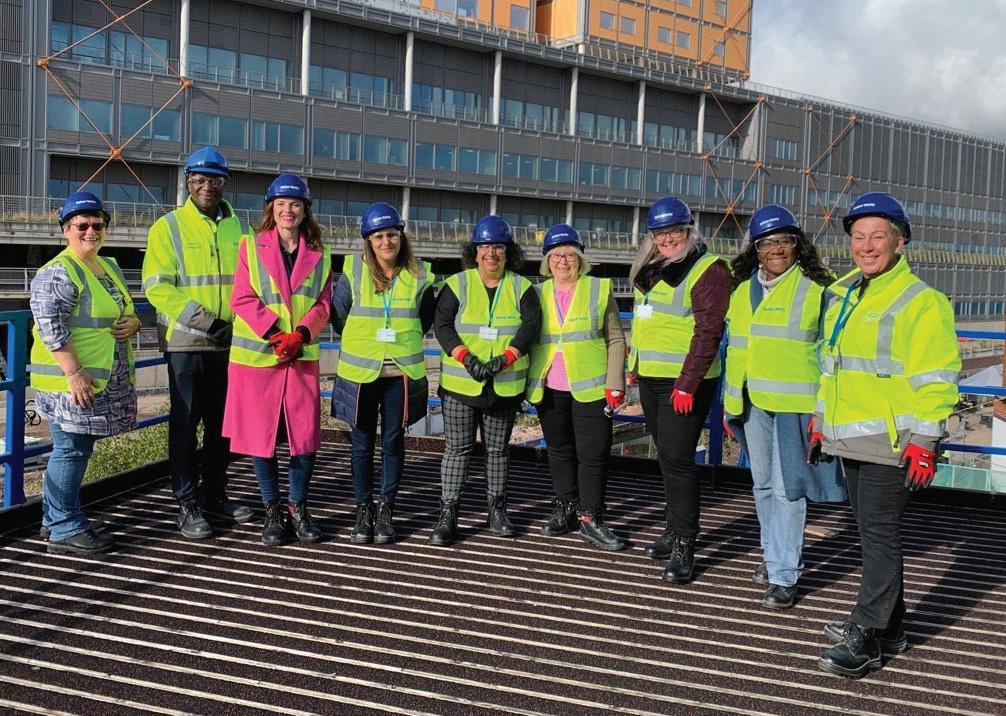
Councillor Pam Randhawa remarked: “It has been a privilege to get a behindthe-scenes tour while the new hospital is under construction. It is a much-needed development for the area. The building dominates the local skyline and will provide integrated care that meets our needs now and well into the future.
“The delivery team are well ahead in patient planning, news that I will be pleased to share with people when I speak to them about Midland Met. Plus, it will support
includes services that cover our patients, people, and population.
The biggest benefit that Midland Met will bring in your opinion is...
It will have streamlined, tailored treatment for patients delivered in a structured standard way.
the revival of the local economy on many levels, including the development of a new learning campus and wider regeneration plans that the Trust feeds into.”
Rachel Barlow, Chief Development Officer who hosted the visit, remarked: “Having these conversations with all our stakeholders is crucial. Two way communication about our plans is vital so that we are transparent about Midland Met and any proposed changes.
“The Oversight and Scrutiny Committee have supported this project from the beginning. We will continue to work collaboratively to explore all the opportunities Midland Met offers in terms of clinical care, regeneration, creating jobs and opportunities for the people in both Sandwell and West Birmingham.”
13
NEWS
Sandwell and West Birmingham NHS Trust
Saleem Mohammed
Members of the Oversight and Scrutiny Committee at Sandwell Council
Winter plans see new schemes introduced
Same Day Emergency Care (SDEC), the Urgent Community Response (UCR) and the introduction of the integrated front door team (IFD).
As winter approaches and we see an increase in demand across our services, the Trust continues to focus on three areas which will ensure we provide the right care for our patients in a timely manner.
Working with community colleagues we aim to reduce admissions by diverting patients away from our A&E departments and improve access to diagnosis and treatment on the same day.
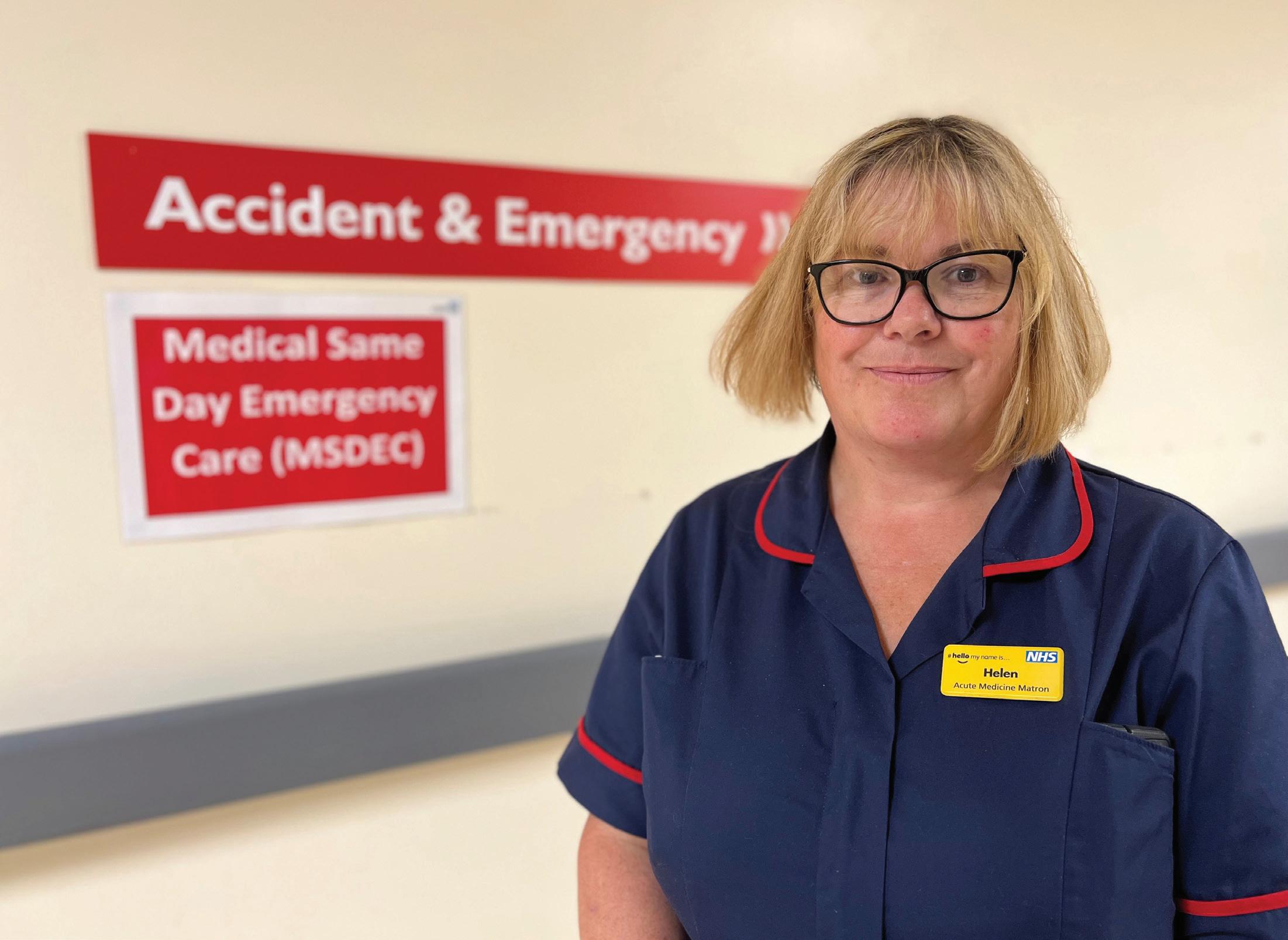
Secondly, we will be working to reduce the length of stay through quicker discharge, with increased access to services and treatment in the community. And finally, we will continue our programme of maintaining elective services to prevent a further deterioration in patients currently waiting for non-urgent treatment.
The above will be done through several schemes, which include virtual wards,
Through delivery of these schemes over winter and long-term we expect to be able to reduce the pressure felt in an acute setting.
Andy Wilkinson, Assistant Director of Operations, said: “We are focused on sustainable schemes over winter which will continue to relieve pressures as we go through winter and beyond.
“We’re doing this by introducing or enhancing current services, like the virtual wards which focuses on delivering hospital treatment at home, like oxygen weaning which has the potential to reduce our respiratory bed days by up to 20 per cent.
“This is up and running with our first patients across all specialties to test clinical models and will be rolled out fully over the coming weeks.
“There’s a dedicated frailty SDEC team in place who are based in the Acute Medical Unit at Sandwell.”
Andy added that the UCR is in place and responding to community respiratory patients in distress. It’s a seven-day model operating from 8am-8pm and they can be contacted to tend to acutely unwell patients in their own home. The falls element to the service will begin in January.
“Added to these schemes is the integrated front door team who will have knowledge of patients from the community, who may turn up to our A&E department without really needing it,” explained Andy.
“They will be able to identify complex community patients and ensure the right care pathway is followed for them.” The Integrated front door team is due to be in place in early 2023.
“As you can see there are a wide range of services that are strengthening our winter plan which will lead to improved care whilst also relieving the real pressures we see within our healthcare facilities.”
14
CORPORATE AND GENERAL NEWS
Helen McGiveney Matron for the medical same day emergency care team


15 • Blue Light Card – available for £4.99 with discounts on a range of national and local businesses • Advice and support from Sandwell Council including crisis payments • Advice and support from Birmingham Council Help from other sources % % % • School uniform swap shops at City, RRH and Sandwell • SWB Benefits portal – every day discounts on a range of supermarkets, leisure activities and other purchases (you can also access salary sacrifice shemes here) • Free on site gyms at Sandwell and City Hospitals • Free wellbeing treatments accessed through the occupational health service Everyday discounts % % % % • Real Living Wage Foundation –no staff member is paid below the real living wage (more than the national minimum wage) • Wagestream – (coming soon) - by signing up you can draw down a proportion of your monthly salary during the month, rather than waiting for your monthly payday • Salary sacrifice schemes –save tax with childcare vouchers, cycle to work, cars and technology • Money Matters seminars Your Pay • Discounted hot food for staff at Trust retail outlets • Daily meal deal at £1.50 per portion (28 Nov) • Pop-up shop at Sheldon block, City, opens 6 Dec with cheap groceries to purchase Food % • FREE staff parking on our main hospital sites • Discounted public transport for staff • Tusker car scheme Travel and transport % % % % % FREE % % % % Cost of living support We've all heard about the rising cost of living in the UK, and with winter approaching and bills set to rise the Trust is aware of the impact this could be having on colleagues. To support on this, we've pulled together a number of sources which could provide help and advice. To find out more, search Cost of Living on Connect.
We now have our values and the behaviours required
Ambition behaviours:
We put our hands up when something goes wrong, seeking to learn and grow from mistakes, asking “why has this happened?” rather than “who is to blame?”
1. We work to be better and do better for ourselves, each other and our patients
2. We work as a team with our people and our partners, supporting and lifting each other up
3. We take pride in what we do, we recognise and celebrate success
4. We are brave and willing to step outside our comfort zone to try new things and share new ideas
The best organisations have strong healthy cultures with values at their heart.
As suggested by you our values are – Ambition, Respect and Compassion.
Values are meaningless without behaviours to drive them so throughout November we have been inviting colleagues from across the organisation to join us in developing the behaviours we need to demonstrate to live our values.
Working alongside the senior leadership team colleagues have been looking closely at how we can embed our new values and behaviours to create a culture to deliver our strategic objectives. From reviewing the people plan to understand how staff experiences impacts on culture and development through to how we establish a cultural change for the better.
It’s clear that behaviours should be clearly demonstrated by everyone at all levels – from the
newest to the most senior, but it’s also important to understand that the relationship between the new values and behaviours and the fundamentals of care.
Our ARC values are central to our fundamentals of care, they are the heart of everything we do, they will be demonstrated through our actions and behaviours and be positive drivers to achieve our 7 Fundamentals of Care Standards.
By changing our behaviours and delivering on our values, we will be able to meet our three strategic objectives
1. Patients: To be good or outstanding at everything we do
2. People: To cultivate and sustain happy, productive and engaged staff
3. Population: To work seamlessly with our partners to improve lives.
Respect behaviours:
We treat everyone as an individual with respect and genuine interest, speaking to the person, not their role, band or condition
1. We make sure everyone feels welcomed, valued and respected equally, with tolerance and without judgement
2. We keep people informed and explain what is happening, with clear communication at each step of the way
3. We actively listen, making sure everyone’s voice is heard and they feel safe and able to speak up
4. We have respect for resources, other people’s and our own time and the environment
Compassion behaviours:
We put our patients at our heart, caring for them with dignity at all times
1. We have empathy, understanding everyone has different life experiences, skills and resilience
2. We take time to do the small things that can make a big difference
3. We won’t walk by when someone or something doesn’t seem right
4. We are kind, open and approachable, saying a friendly good morning with a smile, and a thank you at the end of the day
CORPORATE AND GENERAL NEWS
Prompt escalation and clear, thorough documentation of a difficult and deteriorating situation. You kept the patient updated, and safe, ensuring the right people were in the room as soon they were needed.
Shout out has been a regular feature in Heartbeat and it is fantastic to see colleagues regularly taking the time to give positive feedback to each other.

We regularly receive positive feedback from our patients too, and this month we wanted to share some of those heartwarming messages which have been sent via our website and social media platforms.
Message received from deputy Head Teacher: Just a quick email to let you know how much I’ve appreciated the support of the CCNs at the beginning of this academic year. It is a really stressful time and they have been amazing. Jane, Caroline, Jess, Amanda and Louise are always so kind, professional, efficient… I could go on. I’m very lucky to work with such a wonderful team.
I had an email in my inbox from a relative of a patient with sleep apnoea whose family member needed a new mask for his machine. I phoned the respiratory team and David was great and promised to sort it out for them without hesitation.
Just wanted say thank you Marie and Senzi from Scanning department for all your help and going the extra mile. We really appreciated your support and kindness. From Gynaecology 6A Jenny Oliver.
From – Jenny Oliver
Blanche dedicated lots of time and support to a first time mum who spent a few nights on M2 ward recently. The support Blanche gave helped mum feel more confident in feeding before she went home. Mum still struggled at home but has overcome loads of challenges and said that she could not have done it without the support in the night that Blanche gave. Drop off rates for breastfeeding are significant and 8 out of 10 mums not breastfeed for as long as they would like to. Thank you Blanche for the support you give because it really makes a difference.
Toni has implemented a system within Eye theatres, where they have reduced the amount of plastic bags for patients property, also saving money as well. She sourced and purchased baskets her self; for property to go into whilst patients are in theatre. it is an excellent way of reducing waste plastic.
We have known Sanah since she was an apprentice and she has bloomed in the last few years to a most respected member of out team. I am so proud of the high standard of work she puts in especially on using her initiative to sort problems out and then letting the senior staff know when she can't. I am always able to rely on Sanah and have full faith in her actions. It would be lovely to see Sanah to grow into more senior roles. Thank you Sanah for all you do.
To – Cardiac Day Unit
A BIG Thank you to all of staff on the Cardiac Day Unit (City), you all looked after my husband so well on Friday the 14th of October, he was very nervous but you made him feel at ease. Thank you for all of the hard work you do you are a credit to the Trust.
To – Tracey Ellis, Surekha Kainth and Rachel Cooper
On October 6th, I was on a LD shift on AMUA. It was a tough shift. It was extremely busy and constant. If it was not for the support and teamwork of these 3 ladies, my co-workers I would have drowned.
From – Debi Miles
Huge thank you to Eric Thomas from IT, he helped us with multiple IT issues, 365, one drive and email issues, no tasks were too much for him. Thank you, Eric.
thank you from the Blue District Nursing team for allowing all team members to shadow your clinics. It has been great to see what happens after we refer patients. They have been really informative and fun! Thank you!
Kelly a big thank you from myself and the whole team for working so tirelessly. We see your efforts and appreciate all you do. You are always so kind in your mannerisms even though I know we are struggling as a team with low staffing levels and heavier workloads. Thank you for the support you always give.
Aaron has helped us at incredibly short notice this week - thank you! Without his prompt responses we would have struggled to smoothly on-board new Locum staff. He is always helpful and cheery with it :-)
Manjit has taken on the role of cascade training for the HCAs at BMEC-OPD. She is doing a fantastic job she has gone above and beyond the extra mile. Just want you to know it's really appreciated!
18
To – Marie Pritchet and Senzeni Nkala
To – Eric Thomas - IT
From – Minara Khatun
To – Diabetic Foot Clinic Team
A huge
From – Blue Team
To – David Cartwright
From – Dottie Tipton
To – Sanah Naseer
From – Aysha Miah-Karim
To – Hannah Farmer, Amelia Bull and Prakash Vadukal
From – Chloe Travers
To – Toni Hardwick
From – Dawn Hall
To – CCN -Special Educational Needs Team
From – Petrina Marsh
To – Kelly Barnickle
From – Aysha Miah-Karim
To – Blanche Singh
From – Infant Feeding Team
From – Angela Jones
To – Manjit Basi
From – Cindy Sanghera
To – Davindera Simak
Davindera (Nicky as she likes to be called) recently started on the Neonatal Unit. She has settled well and is an extremely hard working member of our team. She has gone above and beyond her work duties, and has really supportive to our doctors Nurses and myself too.
From – Kathryn Laise
To – Aaron Hyett
From – Nicola Plunkett
Nursing education team plays host to fundamentals of care
Officer, Sarah Carr-Cave, Deputy Chief Nurse, Jamie Emery, Patient Involvement and Insight Lead, Hayley Griffiths, Practice Education Lead and Aaron Bertram-Miller and Stacey Clarke, Nursing Associate Practice Educators.
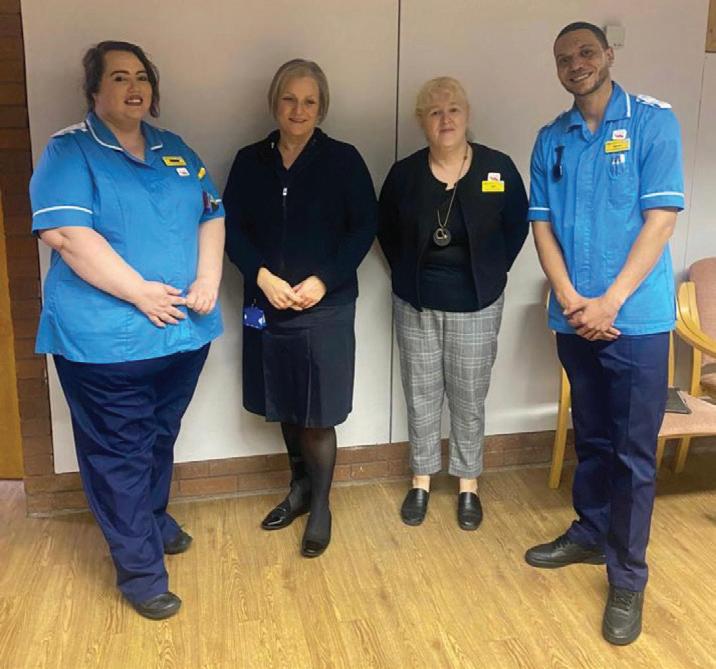
Aaron believes there were many benefits from the event, including the feedback received from attendees.
He said: “It was great to get a real insight on how other wards and areas work and how they will be able to apply the fundamentals of care to their department and improve the quality of care we offer at the Trust.
importance of this.”
She added: “I always look at my patients as if they were my relatives and treat them as such. All clinical staff should do them same.”
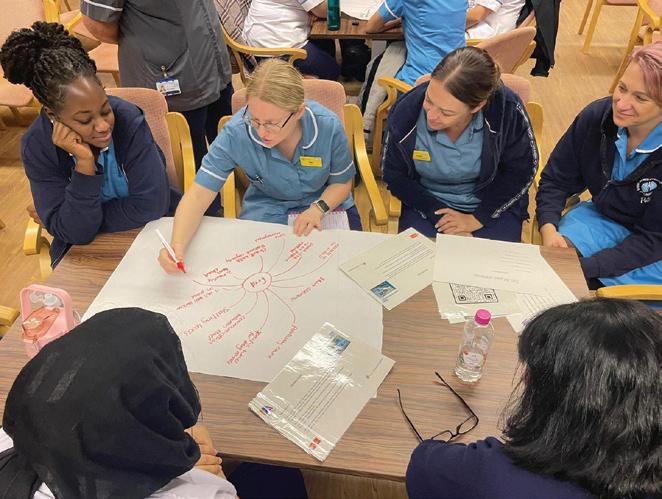
Nursing associate educators Aaron Bertram-Miller and Stacey Clarke successfully facilitated a bespoke fundamentals of care event targeted at nursing associate apprentices, qualified nursing associates and nursing associates at the start of November.
The tailored event aimed to give the 60 clinical colleagues in attendance a better understanding of the fundamentals of care and how the strategy would affect them. By spreading awareness of the patient experience, we hope to deliver high standard care using the framework.
There were an array of guest speakers at the event including Mel Roberts, Chief Nursing
“We received invaluable feedback from the students, and it was a good opportunity for the students to be able to engage with us the speakers and other key stakeholders at Trust. The session was very thought provoking and got a lot of students talking about patient safety.
“I like to remind the students that care doesn't wear a watch so we shouldn't feel rushed about delivering basic care. Fundamentals of care should be our culture and not just a hot topic."
Stacey echoes these thoughts and said: “With the Trust planning on opening its new hospital in 2024, there is a lot of going on at SWB which is why events such as these hold such significance, and the organisation must not forget it’s basic care needs. The fundamentals of care event reminded colleagues of the
The event itself was very successful and the nursing associate educators are planning on repeating the sessions on Friday 2 December 2022 and Wednesday 15 February 2023 to first and second year student nurses and midwives. If you or your colleagues are interested in attending either event or want to find out more, please email swbh.nurse-education@nhs.net.
Supported internships give valuable experience and independence
Vulnerable young people from across the region are reaping the benefits of a new supported internship scheme that is providing valuable work experience, independence and opportunities for development.
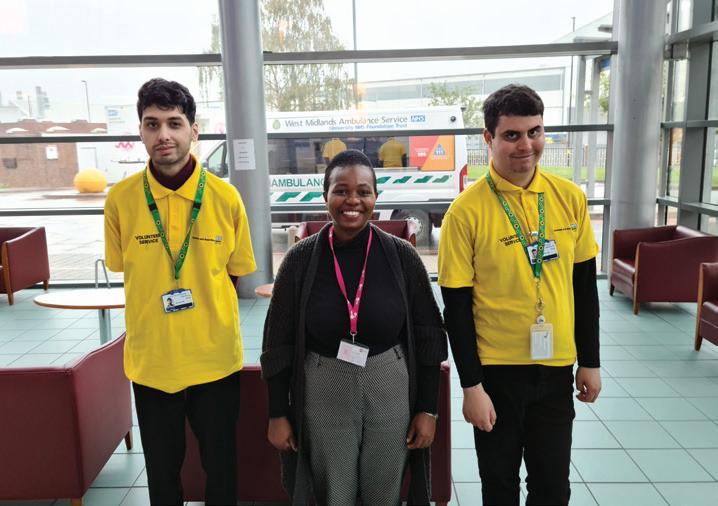
The Supported Internship Scheme, which launched in partnership with Mencap and Sandwell College, looks to provide young people with learning difficulties and physical disabilities aged 16 – 25 with the same opportunities to gain work experience and develop their employment prospects that other people would receive.
Announcing the scheme, Heartbeat spoke to Volunteer Services Manager, Patricia Hunt. She said, “We are delighted to be partnering with Mencap and Sandwell College to ensure that all students, whatever their physical or learning ability/ difficulties, gain work experience.
“When you talk to the young people who join our scheme, they all say ‘I want to gain some work experience so that I can be independent’.
“At our Trust, we’re supporting this project through our Youth Volunteering Champions programme.
“Every student we have from these organisations is supported by a job coach who offers focussed support to the students during their shift until the student feels confident and comfortable to work independently.
“The supported interns currently cover a ‘meet and greet’ role for approximately 3 months before they are placed in an area of their choice, and at this point the widening participation team find them a placement.
“We currently support five learners from Mencap with many more joining in the near future.”
For more information on the Supported Internship scheme contact Patricia Hunt on patriciahunt@nhs.net.
19
AND GENERAL
Stacey Clarke, Sarah Carr-Cave, Mel Roberts and Aaron Bertram-Miller
CORPORATE
NEWS
Colleagues discussing fundamentals of care
Supported interns Zachariya and Yousef alongside Job Coach Mina Etse
S Ar AW RDS
Over the next several months, we will celebrate winners of the 2022 Star Awards, recognising them for their hard work and the positive impact this has had on our people, patients and population. We’ll be speaking directly with the winners to get their views and hear what winning meant to them.
For the first Our Winners, we spoke with the winners of the Award for Equality, Diversity and Inclusion and the Partnerships with the Community Award.
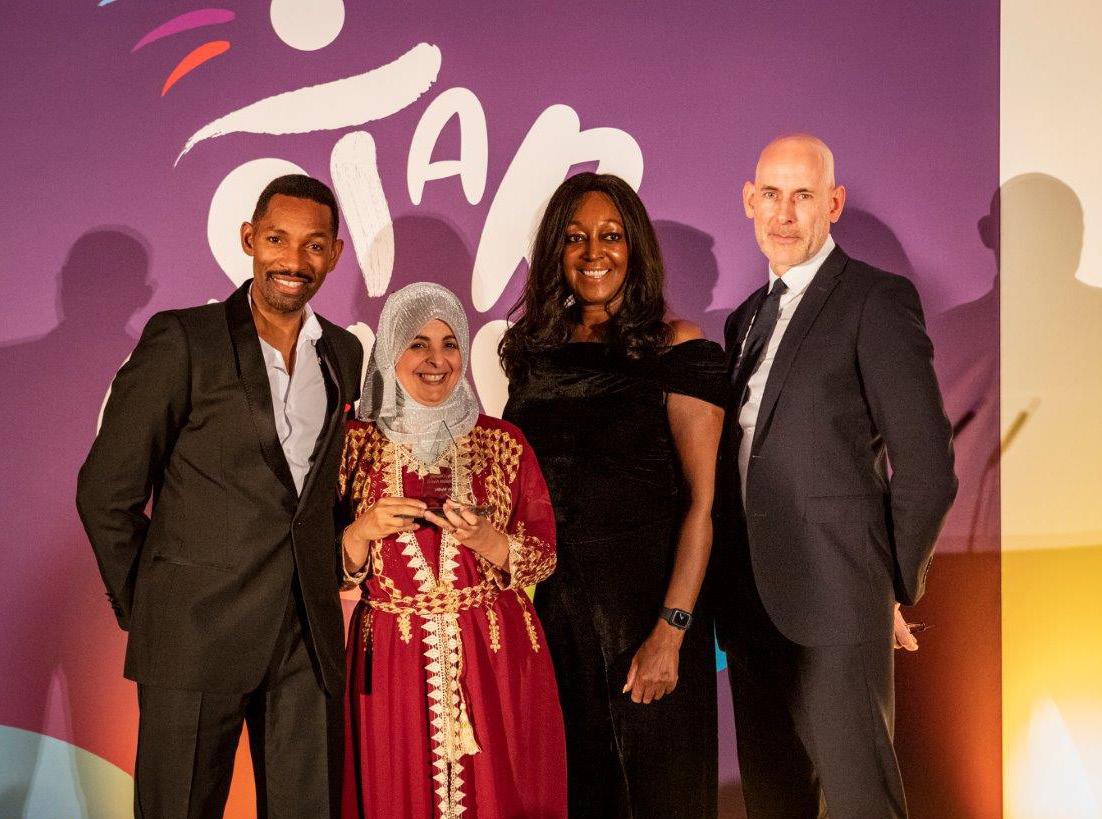
Award for Equality, Diversity and Inclusion
Afrah Muflihi, winner of the Award for Equality, Diversity and Inclusion, is the first ever EDI Lead Midwife in the West Midlands region. This secondment role is funded by the local maternity neonatal system and was initially in place for 12 months: following Afrah’s success in the role, it has been extended for a further 12 and is now being rolled out to each and every trust in the Black Country.
Upon starting in the role, Afrah recognised that she had a blank and broad canvas. With such a wide remit, she first had to identify the issues and ascertain what she could do to support and address the disadvantages faced by different groups. She noted that such roles can be challenging: “In the role, you will end up upsetting people. In order to have equality, you need to have equity, and that may not necessarily involve everybody.
“We know we have problems with outcomes for disadvantaged women, particularly black and Asian women, so this programme aims to support on that. In addition, we recognised that the experience of our workforce from BAME groups needed looking at. We have our WRES data and a number of reports coming back, and we aim to explore all of that.”
Afrah first looked at the services provided by the Trust. Beginning with antenatal classes, she noted that we do not hold real data on the demographics of attendees: but Afrah had run these classes in the community for years and knew from this who they did not see. She looked at the barriers to attendance, focusing on coproduction with service users; one such barrier was that women are given contact details for the midwife and told to get in touch. Focusing on removing the barrier without creating more work for midwives, Afrah worked to embed the referral into electronic records, thereby creating a seamless process.
In terms of delivery, Afrah again focused on equity and coproduction. She worked to include interpreters and BSL speakers within sessions and to make reasonable adjustments. Specific classes for high-risk pregnancies were already in place, and
Afrah introduced new online and face to face classes, enabling a wider range of women to attend antenatal classes and get the advice and support they need during pregnancy. The success of this is clear from the data: previously, there were no non-English speaking women attending classes. This figure is now 28%, and a high number of these women have been in the UK less than five years and are not in employment, with no access to government support.
Afrah also looked at stillbirth rates, noting that black African and black Caribbean women are more likely to have a stillbirth. Delving further into the data, she discovered that those women are more likely to have been in the UK less than five years and to live in impoverished areas. She utilised existing materials and created new ones: these can be read across several languages with some available in audio for visually impaired women. Afrah is currently working on materials for women with little to no literacy.
Following the creation of the materials, Afrah ran a community campaign to target not just pregnant women, but those around them – most crucially, their families. The aim of this is to embed messaging into the wider community, to ensure they are speaking the same language as clinical staff. She has been on radio, community TV, and in attendance at community fun days. This multi-faceted approach allows her to identify barriers and act upon them, as well as receive feedback, which she views as a learning opportunity.
On her Star Awards win, Afrah said it “It made a huge difference – it validated my role and what I was doing, because I had questioned my work. It’s a difficult role sometimes, and it can make some people feel uncomfortable. Therefore, the award confirmed that we need this and encouraged me to push on. It made me feel psychologically safer, because I felt as though the Trust had my back and believed in what I was doing. “Also, I hoped that it might make people think – if she’s being recognised, maybe we should start listening. The awards were on Friday and I came in on Monday a different person. I would never have thought that an award could have made such a difference.”
20
Afrah Muflihi alongside Des Coleman, Val Taylor and Mick Laverty
Star Awards: Our Winners
Partnerships with the Community Award
Taking home the Partnerships with the Community award was the Integrated Discharge Hub. The team is just two years old, forming in October 2020 during the NHS COVID response. The team is made up of both clinical and non-clinical colleagues, with AHPs in place to support wards and in-reach. Supporting a follow-out model, the team is unique in that it is multi-professional, multiagency and cross-organisational.
Since October 2020, the team has focused on linking up different providers to provide a smoother transition for patients. Amy Crumpton, Clinical Lead for the Integrated Discharge Hub, stated “You still see a historic health and social care divide, and the team’s aim is to join that up.
“We focus on identifying who is leading the conversation and ensuring that everyone is singing from the same hymn sheet.”
With the tagline ‘Why not home? Why not today?’, the team have had some great successes since inception. Prior to the creation of the team, the average pathway 1 discharge was six days. In May 2021, eight months after the team had formed, this number had dropped to an average of 2.1 days. This occurred without any additional resource or funding, and was the result of the team putting the right people in the room and having the conversation together.
Amy noted the significance of the team’s work in light of the discharge to assess model recently adopted by the Trust. Research shows that 50 per cent of care packages are cancelled within 48hrs of discharge, indicating an over prescription of care in hospital. Amy said “Discharge to assess has been best practice in other regions since 2016. In January 2022, we switched off the model of assessing on the ward, and the social worker now assesses the person from home, giving a much clearer view of what they need.”
STAR (Short term and reablement) service, the Sandwell council internal care provider, is now assessing at home rather than using the traditional ward assessment model. This captures people’s care needs accurately in their own homes.
Speaking about the team’s win at the Star Awards, Amy noted it had been “A well-needed boost in morale for the team. Partnership working comes with its challenges, as well as benefits. A tremendous daily effort has led to where we are today, and the
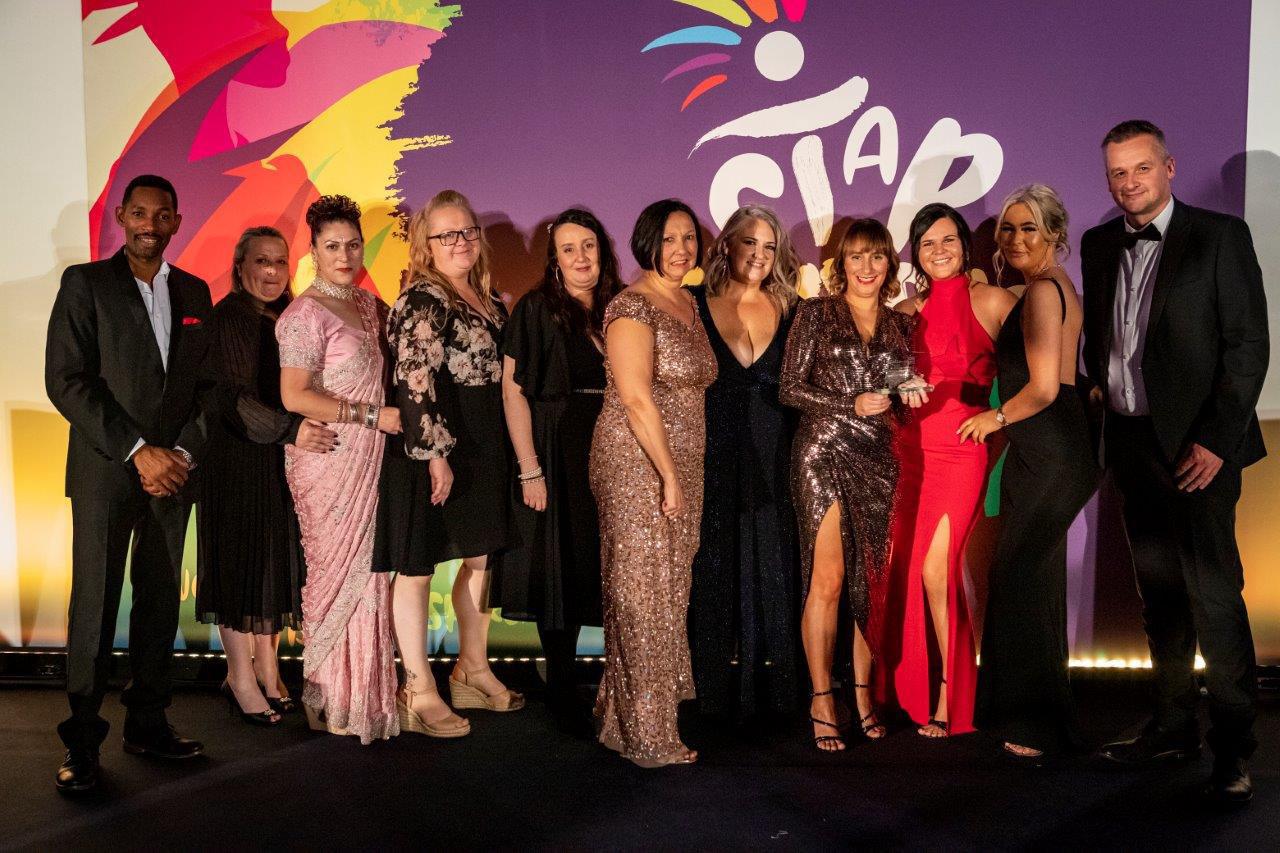
team pour so much of themselves into trying to improve quality of care and people’s experiences of discharge. It’s a challenging end of the journey to pick up on, where they may already be miscommunications or frustrations. The team do a fantastic job in managing, reassuring, and ironing out concerns to make that part of the journey as smooth as possible, and linking this up with community care.
“Whenever you’re trying to lead a cultural change, it can be emotionally taxing for the team. I think trying to shift that culture, of stepping people down to community beds or a targeted home first, was demanding. They needed a lot of grit, and this win, knowing their work was recognised, gave them a real boost”.
The Integrated Discharge Hub
21
Stroke research is bouncing back
MEDICINE AND EMERGENCY CARE
Research across the NHS involves the collaboration of hospitals, universities, pharmaceutical and medical device companies - our team collaborates with several partners to deliver cutting-edge research.
Stroke research aims to improve the care and outcomes for patients admitted to hospital with a stroke. Within our Trust much of this research takes place at the frontline (ED) and the hyperacute and acute stroke unit, located on Priory 4.
All members of the clinical team support the stroke research team which includes Research Nurse Anne Hayes and Clinical Research Practitioners Rebecca Chapman and Rachel Evans.

Dr Sissi Ispoglou, stroke Consultant and Lead for Stroke Research, is passionate about it being part of the clinical pathway and strongly believes that it is everyone’s business.
She said: “Stroke research spans the whole pathway including risk, prevention of or a further stroke (OPTIMAS) or complications (MAPS-2). We serve a diverse population and one of our aims is to provide everyone with the opportunity to take part in research.
“We were a recruiting site for a study managed by Imperial College London [British Repository of DNA in Stroke (BRAINS)] identifying those genetically at risk of Stroke, with a view to developing targeted treatments. Our trial target population was South Asian. We were very excited that over the time we were open we recruited 244 participants from that population who had suffered a stroke.”
Atrial Fibrillation (AF), a common irregular heartbeat, is a major risk factor for ischemic stroke. Indeed 20 per cent of our patients have AF. Long term anticoagulation is used for the prevention of further stroke in those patients. However, it came with a substantial bleeding risk in the early phase after stroke, when warfarin was the only anticoagulant available.
Direct Oral Anti-coagulants (DOACS) such as Apixaban, Rivaroxaban and Edoxaban have now largely replaced warfarin in clinical practice, except for patients who have mechanical heart valves.
Evidence has shown that although they are as effective as warfarin in preventing
strokes in the longer term, they have the benefit of 50 per cent less bleeding in the brain. Their safety and benefit in the acute stroke phase have yet to be proven.
Dr Ispoglou added: “DOACS might allow safe and earlier anticoagulation in patients with AF, by reducing stroke recurrence without increased risk of bleeding. The OPTIMAS trial aims to test this hypothesis with a randomised controlled trial comparing early anti-coagulation (i.e. within 96 hours of stroke) compared to current care (usually between 7-14 days after stroke).
“Stroke is the second most common cause of death worldwide; it is the fourth most common cause of death in the UK and it is the most common cause of disability in the UK. The magnitude of the complications caused by a stroke can result in longer hospital stays and increased NHS costs.
“A major complication post stroke is pneumonia. This is most common in patients where the stroke is severe and impairs their swallowing. The ‘Metoclopramide for avoiding pneumonia after stroke’ (MAPS 2) trial we are about to open, is looking to explore if a common antiemetic (metoclopramide) can help those patients, in terms of pneumonia prevention and better outcomes.
“The pandemic had a significant impact on stroke research worldwide as resources were redirected to the development of treatments and vaccines for COVID-19 and clinical teams were redeployed.
“We are now looking forward to resuming our activity levels and are excited to recruit to new studies that will benefit our patients.”
22
Anne Hayes, Research Nurse; Dr Sissi Ispoglou, Stroke Consultant and Rebecca Chapman, Clinical Research Practitioner
Alcohol care team wins prestigious Nursing Times award
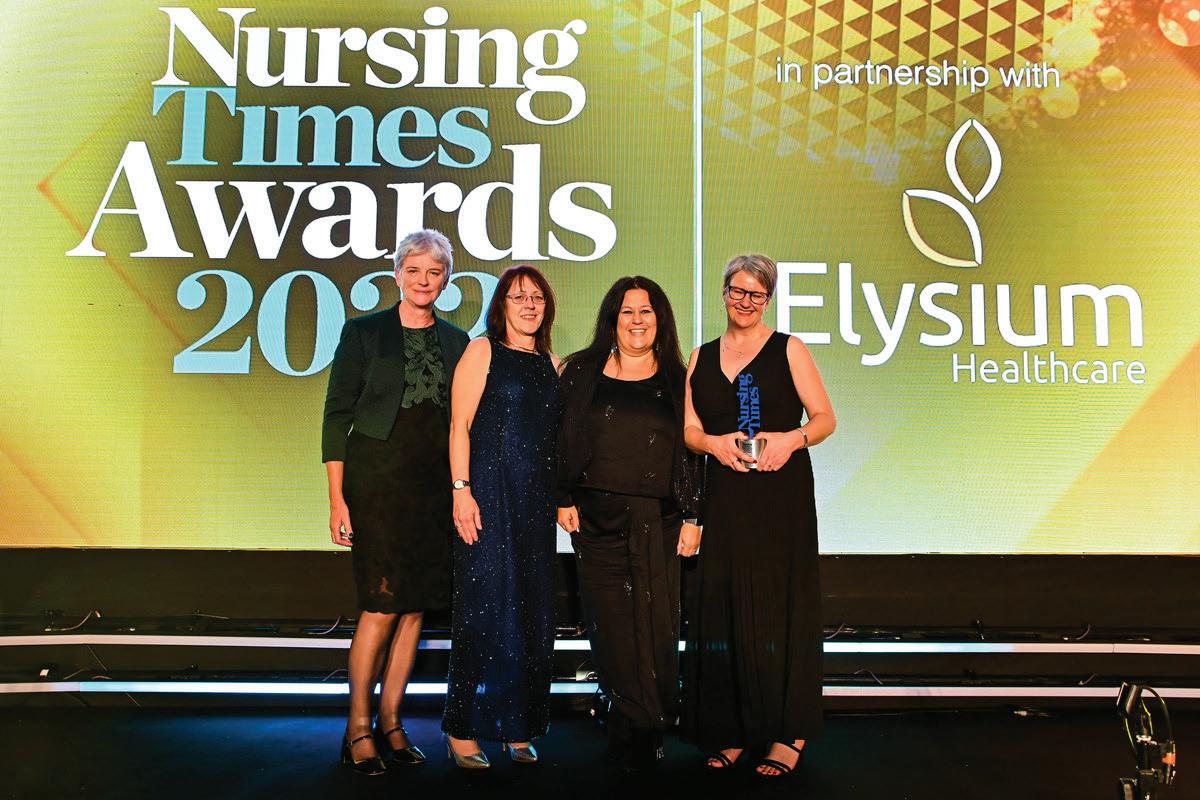
A huge well done to the alcohol care team, who triumphed in the Emergency and Critical Care category at the 2022 Nursing Times Awards.
The team were crowned for improving the care and management of alcohol dependent patients in the emergency department, which they achieved with their innovative approach, empowering patients to take ownership of their own recovery.
The event took place at the Grosvenor House Hotel on Park Lane in London on Wednesday 26 October.
Arlene Copland, Alcohol Nurse Consultant, said: “It is an honour to win this award. The alcohol care team aim to provide a multifaceted, holistic, evidenced-based approach to alcohol related health problems that embrace the individual's health and their psychological and socioeconomic wellbeing, as well as that of their families.
“Working on an outpatient basis, we encourage patients to take control of their own recovery and to work in partnership with us to achieve positive long-term outcomes.
“This involves preventing the 'quick fix' but working with the patient on an outpatient basis to stabilise and reduce their drinking and to improve their coping strategies prior to detox. Working with the patient in this way helps them regain control over their drinking, which is an original concept.
“We as a team have prevented approximately 1950 bed days in the first four years of the initiative and the number of admissions for acute withdrawal reduced from 1.66 per cent of all acute admissions, to 0.68 per cent.
“This model empowers the individual to lead their own recovery, which demonstrates value for the patient and clinical staff, but also has a financial value to the Trust.
“Feedback from patients is that they feel empowered to be the leader of their own recovery and value the bespoke service offered by the team.
“100 per cent of patients surveyed were happy with their care and would recommend the service and 89 per cent service users rated the service excellent, with the remaining 11 per cent as very good.
“Clinical staff benefit from the support and education offered by the alcohol care team
MEDICINE AND EMERGENCY CARE
and the two teams work together in partnership. Emergency department staff have a better understanding of addiction and their judgement towards those attending the emergency department due to alcohol has reduced, improving the patient experience.”
Education sessions - both informal educational opportunities and formal sessions - are provided for emergency department clinical staff to improve knowledge of addiction, reduce judgement towards those with addiction issues, improve withdrawal management and increase the confidence in discharging these individuals to the care of the alcohol care team.
This project has gained attention from NHSE and PHE who published a case study on this service. This model has been used in the national alcohol care team plan to advise other Trusts.
23
The alcohol care team took home the Emergency and Critical Care trophy
Paediatric research room gets a makeover
WOMENS AND CHILD HEALTH
Hospitals that are research active have better outcomes for patients – this is a fact that applies to children as much as it applies to adults. Yet it is rare to see research clinics designed with children in mind, leaving the experience of the youngest patients to chance – until now.
This month, the clinical research unit at Sandwell Hospital celebrated its latest achievement, with the completion of their first child focussed clinical research room following a generous donation from Your Trust Charity, and the design insight and support from Beena Parmar and Jo Maher from the play team.
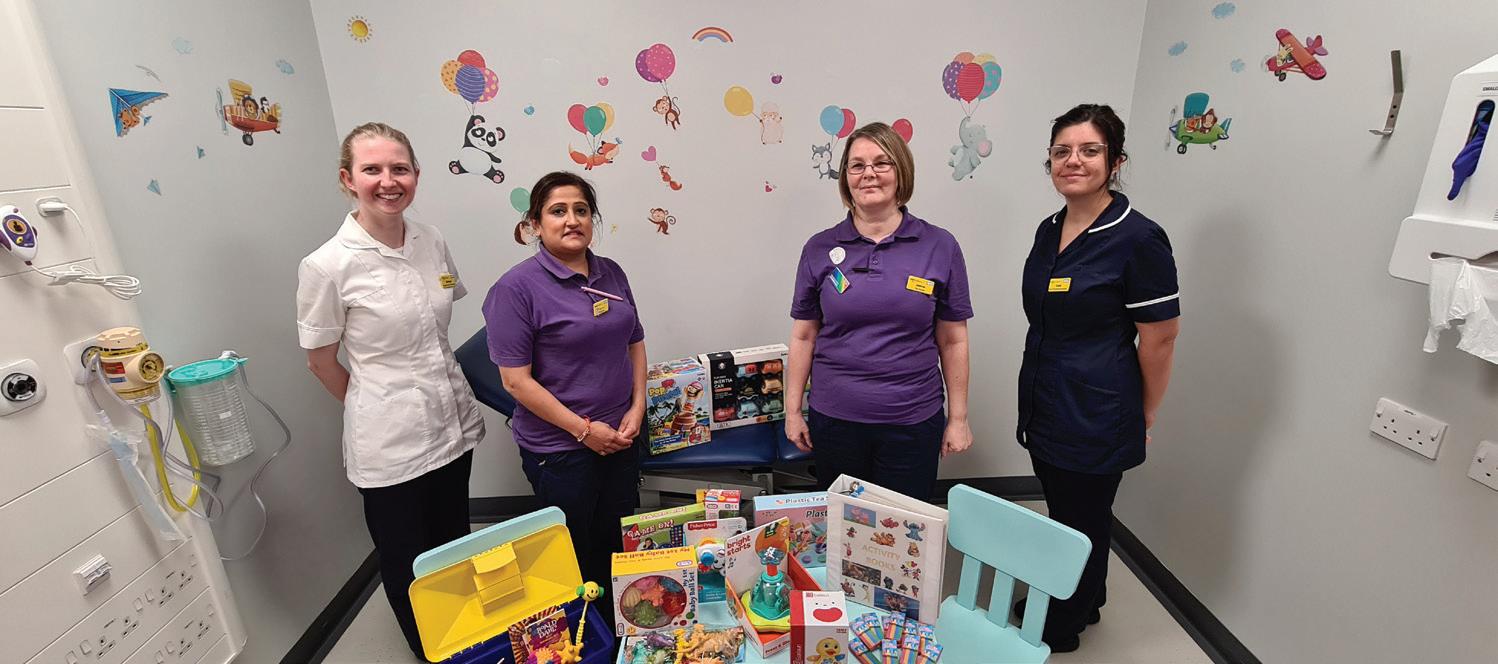
Announcing the opening of the new space, lead paediatric research nurse Carol Zullo said, “As part of the Trust’s strategy, one of the ambitions is to increase patient participation in research, so we are excited to announce we have expanded our paediatric team and are looking now for opportunities to get children and young people involved in research studies.
“We have been able to transform a room in the clinical research unit into a child friendly space to enhance the experience of children coming into the hospital and participating in research. This is a great opportunity to make research accessible to children and having a playroom here at the unit will enable us to enhance patient care by reducing the stress of a hospital visit through playful activities.
“In the coming months we are hoping to open several new paediatric studies which will look to investigate allergies in young children. These studies will provide parents going
through worrying times the opportunity for their child to be involved in research and improve future treatment options for children.
“These patients will be seen in research facilities which we have now decorated to ensure an appropriate friendly environment when they attend.”
The clinical research unit are still looking to expand their team of paediatric research nurses. If you are interested in finding out more contact Carol Zullo on 0121 507 6657.
Training bus drives development opportunities in theatres
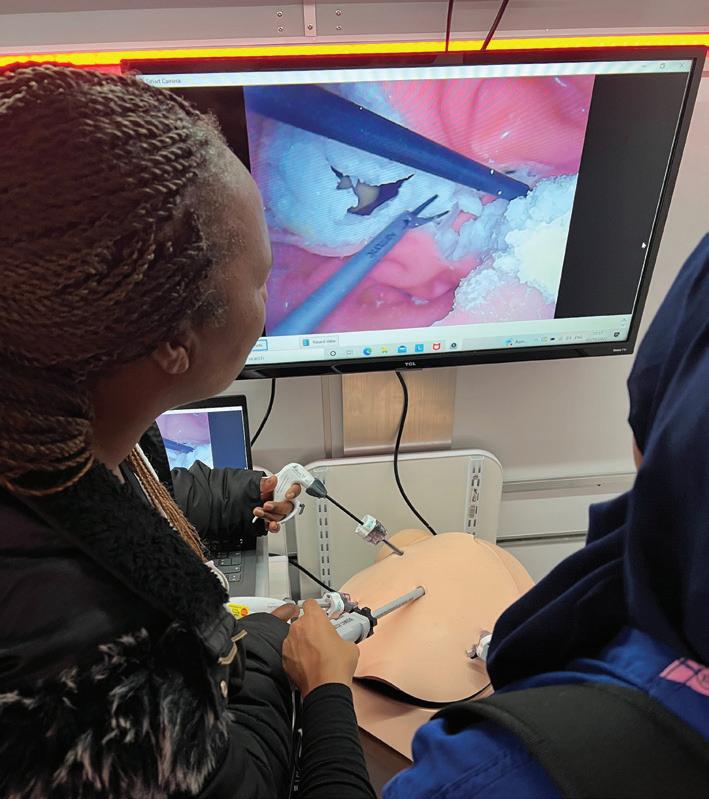
Theatre colleagues were delighted to hone their surgical skills when the Ethicon laparoscopic training bus stopped off at City.
Samantha Beck DGM Gynae, Gynae Oncology and Breast explained: “Over the last couple of years it has been difficult to provide training opportunities like this due to COVID restrictions.
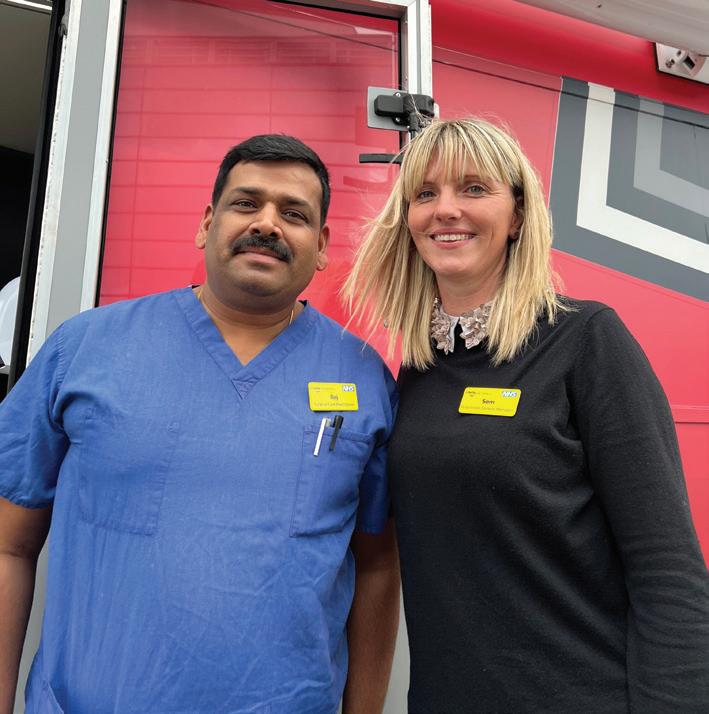
“By hosting the bus on site, theatre staff were able to pop in at their convenience to practise laparoscopic techniques with equipment we use at the Trust. It’s an innovative training offering appropriate for theatre staff at all levels from surgeons to trainees and was very well received by my colleagues.”
Surgical Care Practitioner Raj Gujar agreed, he said: “This is a really useful training experience. It is something different and with the bus coming to us, it means I’ve been able to visit in my lunch break before my afternoon theatre session.”
electrosurgery, sustainability and surgical simulation.
24
Clinical research unit colleagues Rebecca Grenfell and Carol Zullo alongside play team Beena Parmar and Jo Maher
The training offered educational workshop sessions including science of energy, stapling, wound closure, safer
Colleagues practice their technique on the bus
Raj Gujar, Surgical Care practitioner and Samantha Beck DGM Gynae, Gynae Oncology and Breast outside the laparoscopic training bus at City
Maternity lit up pink and blue for Baby Loss Awareness Week
Last month we marked the 20th year of Baby Loss Awareness Week (BLAW): an opportunity for anyone touched by baby loss to have a safe and supportive space to share their experiences and know that they are not alone.
The cause ran from 9 to 15 October and in aid of this, the EQUANS team provided funding for the maternity building to be lit up.
The block at City hospital was among other buildings and landmarks in the UK to turn pink and blue for the duration of BLAW, to raise awareness of pregnancy and baby loss.
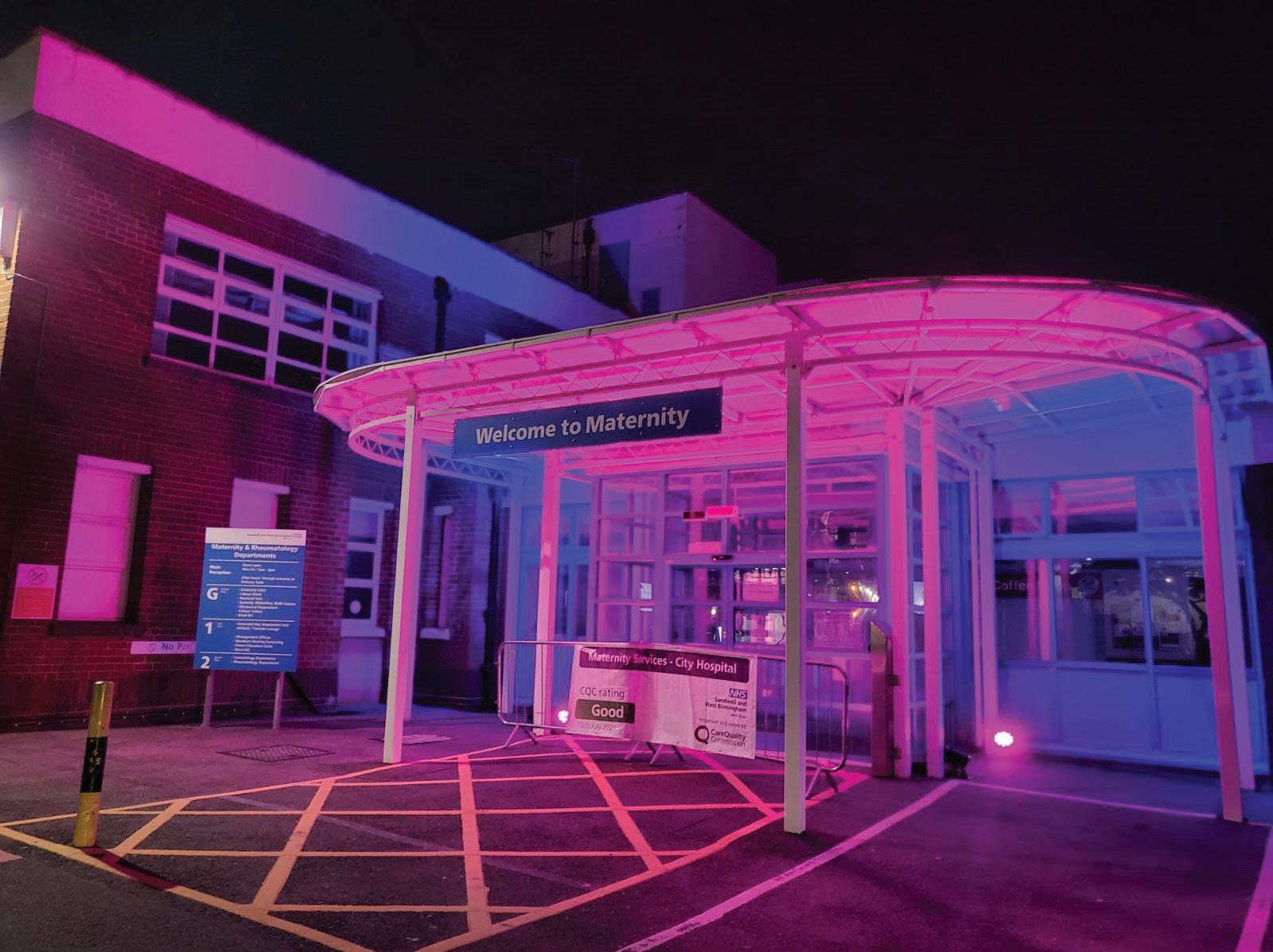
Vicky Weaver, Bereavement Lead Midwife, said: “The loss of a baby is life changing for those who are unfortunate enough to go through it.
“There is still a taboo and stigma around the topic, which means families often feel isolated in their grief. This can be worse within certain communities.
“By raising awareness, we hope to encourage people to talk about their babies and seek support if needed.
“There are many organisations who offer specialist support following the loss of a baby including Sands, Aching Arms and The Lily Mae Foundation”.
Vicky featured on a TikTok video for the Trust’s channel to shine a spotlight on the subject and to encourage people to join in on the global ‘wave of light’, by lighting a candle on 15 October to remember all the babies that are no longer with us.
She added: “We held a raffle and raised £338 which will go towards a local bereavement charity, Aching Arms, and our bereavement room.
“We also had some lovely hampers donated for prizes by Asda Cape Hill and Asda Perry Barr.”
WOMENS AND CHILD HEALTH
Lloyd Williams, Deputy Head of Estates and Compliance, said: “Last year, I arranged the lighting and Christmas tree for maternity – working with the team to ensure they get the tree, colours and support they need.
“I secured it through our budget so that more money could be kept for the maternity team.
“This year, I made an agreement with Clare Wilde and Sam Betley, EQUANS Operations Directors, to sponsor the BLAW lights and the Christmas tree in a few months so that there is less burden on the clinical team as they don’t need to worry about funding.”
25
Maternity building at City, illuminated in pink and blue for baby loss awareness week
Radiology teams celebrate awareness day
IMAGING
Colleagues across the Trust celebrated World Radiography Day on the 8 November, marking the anniversary of the birth of X-rays.
It’s hard to imagine a world today where x-rays don’t exist. They’re the foundation of many medical diagnostic tools and help doctors discover a range of problems.
What’s wonderful is that they do this in a matter of minutes and completely painlessly! As well as celebrating the marvel of the technology, the day also celebrates the hard-working radiographers and radiologists who make x-rays possible.
The imaging team held a stand at Sandwell Hospital to raise the profile of their profession by engaging with patients and visitors and giving out goodies.
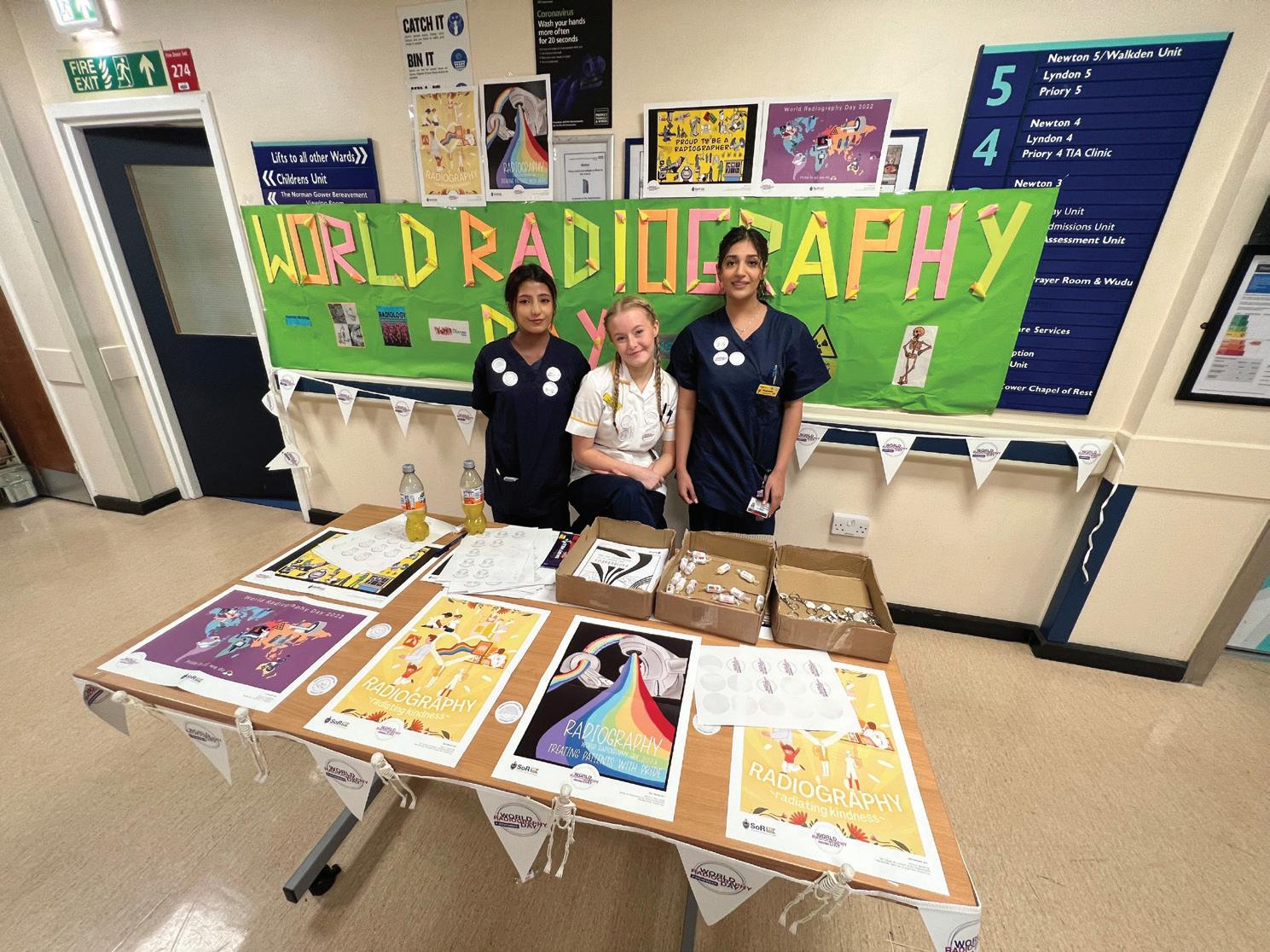
Cheryl Dickson, Superintendent Radiographer, told Heartbeat: “The aim of the day is to raise awareness of our profession and celebrate the contribution that radiographers make to many patient pathways.
“Diagnostic radiography goes beyond just x-rays: we also cover CT, MRI, ultrasound, interventional radiology, nuclear medicine, cath lab, and mammography.
“These technologies allow us to create images which aid the diagnosis and management of injuries and disease, to be able to start treatment promptly and improve outcomes for our patients.”
Meanwhile, the breast unit team have given an insight into how they work as a four-tier system – there are currently four levels of mammographic practice with specific responsibilities and roles within the structure. They are all highly trained to deliver breast imaging and adhere to the highly rigorous requirements of the National Health breast Screening programme (NHSBSP) in both static units and 5 breast screening mobile units in the community.
The roles are consultant practitioner radiographers, advanced practitioner radiographers, practitioner radiographers and assistant practitioners. Each work closely with the consultant radiologists, breast surgeons, nurses and pathologists as part of a breast MDT to provide high quality care to our patients.
Consultant practitioner radiographers
work autonomously and are involved in decisions about patients under their care, and they also have the ability to influence local and national agendas though innovative and collaborative discussions to help develop and deliver strategies through research and education. They actively raise the profile of consultant radiographers by releasing publications in national journals and publications.
The unit has three highly trained consultant practitioner radiographers - Julie Shephard, Louise Tromans and Judy Davis - who hold MSc qualifications and work closely with the Breast MDT. The role of Deputy Clinical Director of the Breast Screening Programme is held by Julie, working alongside Clinical Director Dr Faisal Majid to ensure that national NHSBSP guidelines are adhered to and followed for all staff. Julie is a reference point for the delivery of the service and actively participates in leading research components within the breast unit.
The advanced practitioner radiographer is a highly complex role that includes film reading, breast ultrasound (including biopsies), stereo guided interventional procedures, education and training, audit, and health promotion. This role helps shape the service alongside all other members of the team and help to provide better outcomes for patients by improving quality and services. An advanced practitioner radiographer has the opportunity for career progression within breast structures by strengthening their professional leadership with advanced knowledge to participate
actively in research. Clinical specialists within the unit are also actively working towards consultant radiographer status. Practitioner radiographers specialise in mammographic imaging following successful postgraduate training in mammography practice. Working alongside the clinical imaging team in both screening and symptomatic clinics, supervision of students, trainees and asssitant practitioners as required. They are integral members of the breast unit team and there is the opportunity to extend roles in various areas of the department and development into advanced practice and beyond. As well as working within the static sites, the practitioners work on the five mobile breast units around the region delivering services to a population of approximately 150,000 eligible clients.
Assistant practitioners work both in screening and symptomatic clinics and closely with the clinical team. Working in static sites and mobile breast units, they deliver high quality images. Our asssitant practitioners have achieved a qualification in an accredited course and have become well established members of the team, supporting the workforce and patients seen in SWB. There is scope for development within the structure of the unit and two of our assistant practitioners have recently been promoted as Band 5 senior assistant practitioners, which incorporates additional view training and communication skills in this specialised position.
26
The imaging team with their stall at Sandwell
Community teams take to TikTok to showcase skills

PRIMARY CARE, COMMUNITY AND THERAPIES
Earlier this month the Trust took part in a 24 hours in healthcare initiative designed to showcase many of the roles involved in urgent and emergency care.
Community Staff Nurse Hannah Charlton took External Communications Manager, Anuji Evans with her on a visit to elderly patient Phil’s home to check his leg ulcers and change his dressings. Gaining consent to film from Phil before the visit meant Anuji was able to capture the visit on video, and share on the Trust’s TikTok account under the hashtag BlackCountryHealth247.
Hannah explained: “Phil is one of our regular patients and he is always so grateful when we come to treat him at
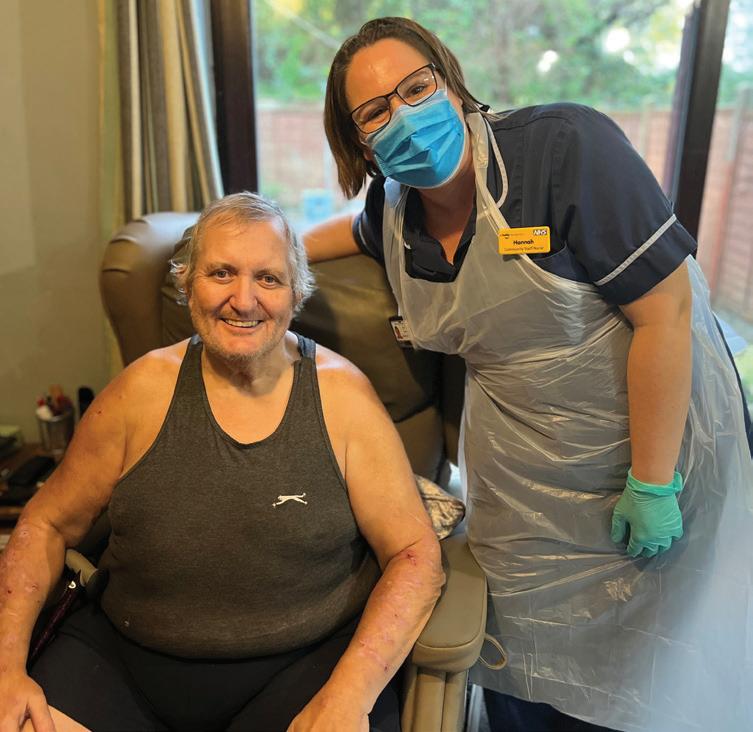
The community nursing team took part a 24 hour social media healthcare initiative
home. It is lovely to have a quick chat with him whilst I’m changing his dressings to make sure he is doing well and has no other worries that might develop into something more serious.
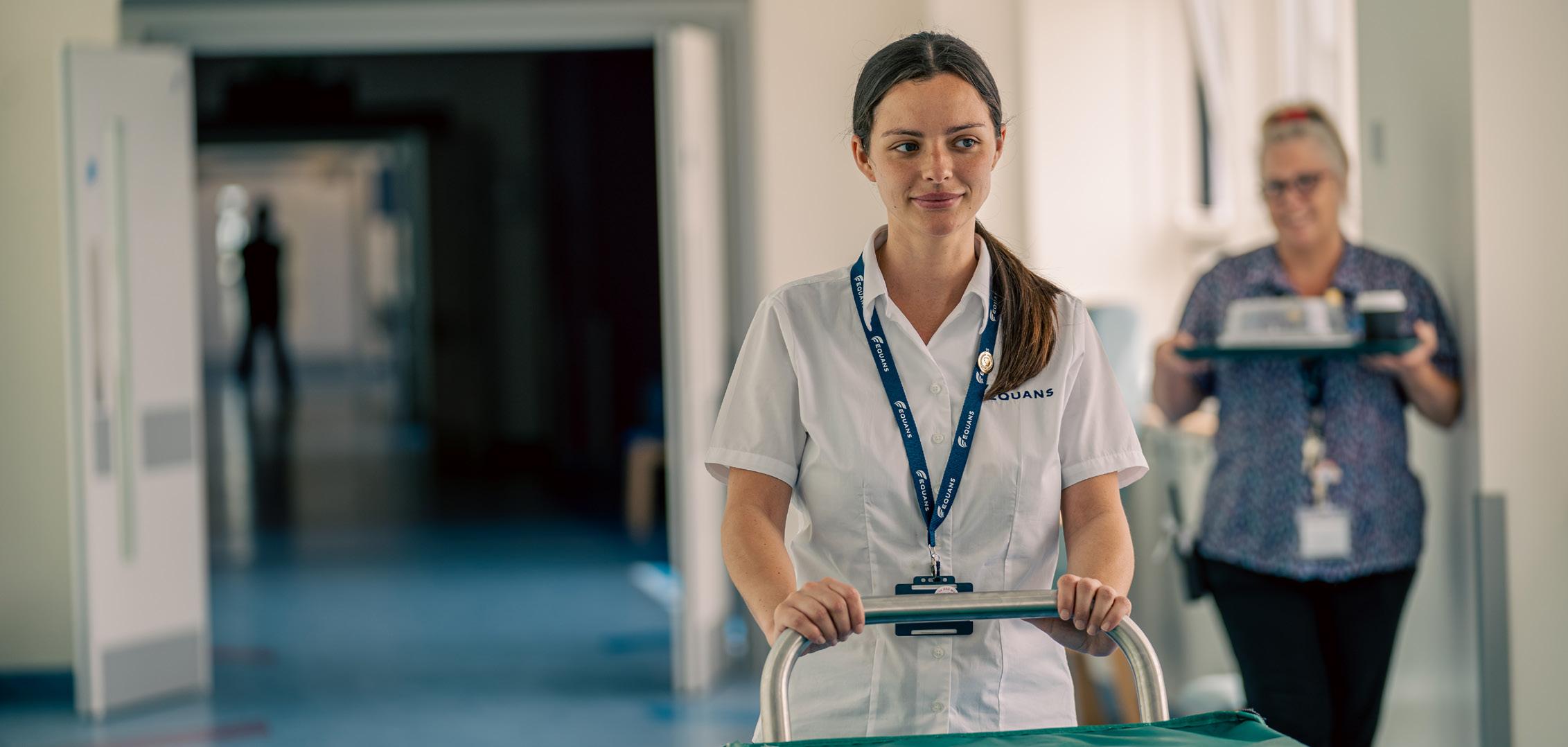
“Working in the community is a vital part of integrated care, as we support our colleagues in acute care by looking after many patients in their own home, and by having good relationships with patients we are there early to intervene before medical issues become more serious perhaps even requiring admission to hospital.”
Since being posted on TikTok the video has been viewed more than 56,000 times, and another one showcasing Hannah’s colleagues has been watched by over 8,000 people.
Tammy Davis Group Director of PCCT said: “We know that our community colleagues are truly valued by the patients they care for, and I think seeing the response on TikTok demonstrates that there is a genuine interest from the general population in the work we do.
“Appreciation is always welcome and for us it motivates us to continue to deliver the compassionate care we are known for.”
28
EQUANS has the mission to connect, power & protect - empowering businesses and communities to not only fully embrace the energy transition, but also the digital & industrial transitions that are redesigning the way we move, work and live.
equans.co.uk
Acting on our commitment to Net Zero by helping our clients to reduce the amount of carbon that is produced across the NHS Estate.
Johanne Newens
Chief Operating Officer
This month we say hello to Johanne Newens who has held the roles Deputy Chief Operating Officer and Acting Chief Operating Officer at our Trust and is now at the helm and leading the way as our new Chief Operating Officer.
Johanne emerged as the stand out candidate following a competitive national recruitment process where she was grilled by internal stakeholder panels alongside two external assessors before securing her role.
Announcing Johanne’s appointment, Chief Executive Richard Beeken wrote, “Johanne served as the Deputy COO at SWB for the last two years, having come to us from The Dudley Group NHS FT, where she was Divisional Director of Operations for Medicine and Emergency Care. Johanne’s commitment to supporting the Trust in achieving our objectives was evident throughout the process.
“Our Chief Operating Officer will be a voting member of our Trust Board, leading service delivery for all our hospital services and having Board oversight of IT & Digital services. Johanne will be working
closely with the Chief Integration Officer, Daren Fradgley, who is the executive lead for community and primary care services and Place Based Partnerships.”
Reflecting on her role, Johanne said, “I joined the Trust at the height of the Pandemic, when the NHS as a whole was under incredible strain as we struggled to manage the impact. I’m glad to say we’re starting to return to
Wave goodbye to…
After 39 years in the healthcare sector, Deputy Director of Governance Allison Binns has retired.
Allison first trained as a nurse at the Royal Free Hospital in London in 1983 and then spent time accumulating experience at hospitals in North London before moving to Northampton to take up a post as lead nurse for head and neck surgery.
“It was at Northampton that my interest in patient safety and risk began,” Allison recalls.
“I did a two-year stint at the Department of Health running a neonatal project before being successful in my application for the head of risk management at SWB in 2010.”
“I still remember my first impressions of the Trust to this day! I came for interview and it still sticks out to me how friendly and helpful everyone I met was, and that hasn’t changed.”
The past 12 years have flown by for Allison as she has the opportunity to work with an array of different people, across all levels during her time at the Trust.
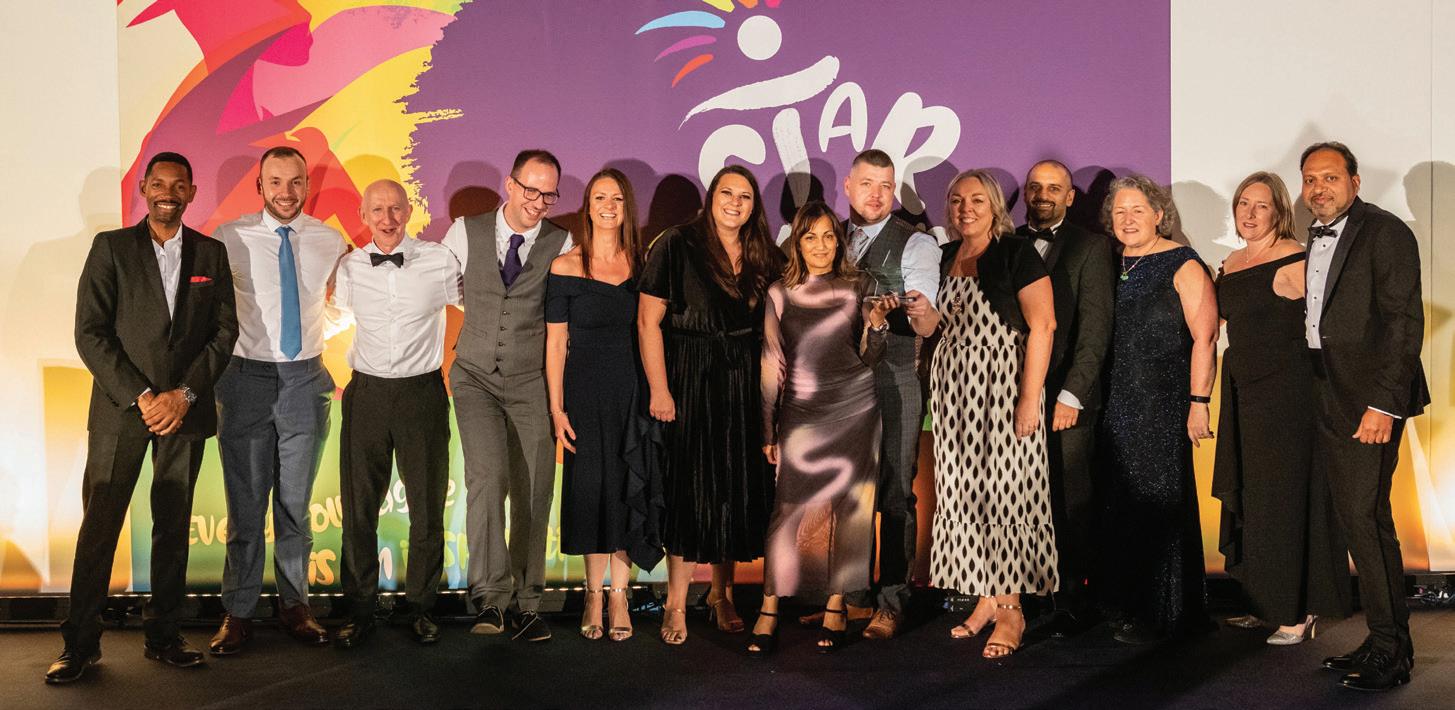
During her time at SWB, Allison has worked with an array of clinical and non-colleagues who believe she will be truly missed.
Fay Shorter, Head of Complaints said: “I would like to thank Allison for her support and guidance during my first months working at SWB, particularly as I was new recruit to the NHS. She was never too busy for a quick question or a more in-depth conversation.”
normality now but this is down to the courage and tenacity of colleagues at the Trust.
“With Midland Met on the horizon we have a lot to look forward to, with the completion of the new build, the roll out of our acute care model and the unification of acute services on to one site. There is a lot of work to be done, but it will all reap its rewards with our improved services for the people and patients of Sandwell and West Birmingham”
Allison Binns Deputy Director of Governance
Marsha Jones, Deputy Director of Governance – Knowledge and Learning, echoes these thoughts and said: “Allison has been a great colleague in my first year at the organisation. She has been a great support and willing to share her knowledge and expertise; not just in all she knows of clinical governance and safety but also helping me navigate around the Trust. She has always put patients first and shown clinical integrity.”
Kam Dhami, Chief Governance Officer, added: “When Allison joined the Trust in 2010 her first success was project managing the organisation to CNST Level 2, a huge achievement given previous failed attempts and the short time available. It was a sign of things to come. Her passion for clinical governance, especially patient safety, has been unwavering and her advice and guidance are valued by so many.”
Though Allison will be retiring, she is hopeful for a future return to healthcare in some capacity as part of the COVID response work in the NHS.
Happy retirement Allison!
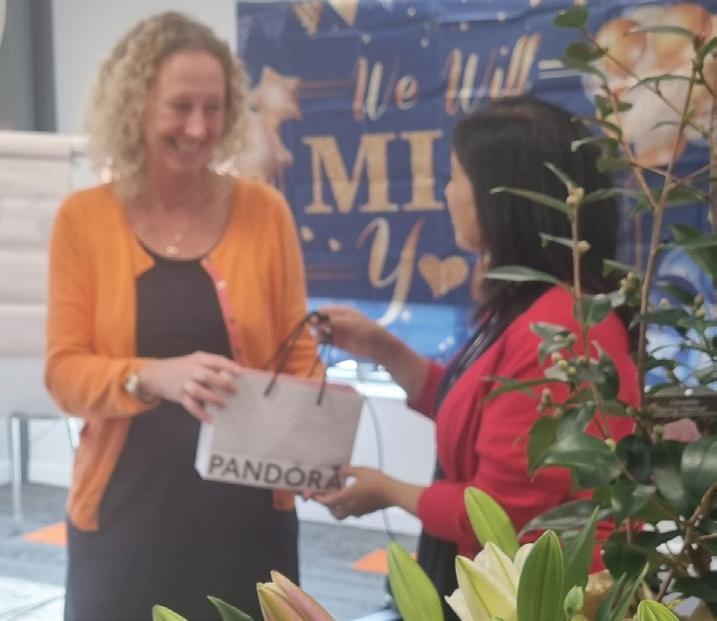
29
Allison Binns receiving a retirement gift
Chief Operating Officer Jo Newens presented the Special Recognition Award at this years Star Awards to the Emergency Department
Letters, of less than 200 words please, can be sent to the Communications Department, Trust Headquarters, Sandwell Hospital or by email to swb–tr.SWBH–GM–Heartbeat@nhs.net
Privileged to be part of fundamentals of care event
Dear Heartbeat
I had the privilege to attend the fundamentals of care event at West Bromwich Albion. I say privilege, because in my 20 years in this place I have never been invited to join others and senior people from the organisation so can I tell them how we can be better.
It was nice that people really listened to me. I am so down the pecking order, this was a big thing for me.
Now that I’m back doing my low pecking order job, I wonder whether anything will really change. Did you even take away what I said? When will change come?
Kind regards Anonymous
Dear Anonymous, Its great you were able to attend. There is no pecking order within the Trust; we all have a part to play in providing patient care and I want to hear from everyone.
We are now pulling together all the information from the event, holding some follow up events and setting out next steps which you will hear about over the coming months.
The priorities for the year are communication, harm free care and the patient journey.
It takes time to make change and that change can start with you and how you want fundamentals of care to look like in your area of work. This is a 5-year strategy and links with the people plan. Culture change starts with us all as individuals and only we, if we want to, can change the culture within the organisation.
Kind regards, Mel Roberts Chief Nursing Officer
Should we really be using internet explorer?
Dear Heartbeat, Forgive my ignorance of certain levels of tech, but is there any way to avoid the use of internet explorer on trust systems?
It is good that the trust sends out regular comms, but very frustrating when you click on a link that defaults to IE and then get an error message that asks you to upgrade your browser. Is this a setting on my local device or a trust wide problem?
If we shouldn’t be using IE, then why can’t we remove it from trust computers?
Yours in frustration
Dermot Reilly
Dear Dermot, Some of our clinical systems that were written in the last millennium only run on internet explorer. We are working with the suppliers to try and sort this issue and eventually get rid of internet explorer. It is a Trust wide problem. However you can choose your own default browser.
You are able to change the default browser on your laptop by searching ‘default browser’ in the search bar and clicking your preferred option in device settings.
If you’ve got any questions, I’d be happy to talk this through in more detail.
Kind regards, Martin Sadler Executive Director of IT & Digital
30
RIGHT TO BE HEARD Want to relax and unwind in a safe place? Visit the Wellbeing Sanctuary and enjoy a range of free treatments including a massage, meditation and relaxation hypnotherapy. Call 0121 507 5886 to book your free session today.
YOUR
Richard talks about: the latest budget and what it means for SWB
Richard Beeken, Chief Executive
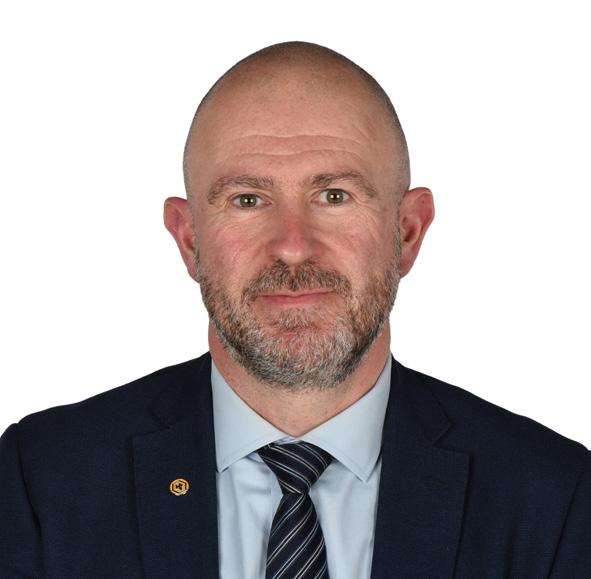
By the time you read this, the latest budget will have come out from HM Treasury. The expectation is that public sector spending will experience significant challenges with little or no growth and indeed budget reductions. The expectation is that, in order to plug a £60 billion gap in public finances, taxes will rise too. The NHS is not immune to these pressures, and it hits us at a time when demand for patient care outstrips our ability to deliver to the same standards as we did, pre-pandemic.
It is a particularly bleak picture. I want to be honest with all of you about what it means for us but also encourage you not to be distracted and brought down by the national and global economic outlook.
What is our situation like at SWB? Well, for the first half of this financial year we have spent much more than we planned to spend. And we haven’t seen and treated more patients, in fact, the opposite – on elective care we have, until September, been delivering fewer operations and procedures than we did in the corresponding period, pre-pandemic. If we carry on spending in this way we will exceed (significantly) the deficit budget that we had already forecast.
Why are we spending more than we planned?
As you know, the biggest costs that we have are on staff. We have done well on recruitment to vacancies at band 5 level and our Trust is in a much better position with substantive staff than it has been in recent years. Despite this, we continue to spend more on bank staff and agency staff to fill shifts. This is driven by both sickness levels being 2.5% higher than normal and skill mix gaps at band 6 and 7 level, for example.
Does it matter?
NHS finances may seem irrelevant or unimportant to you and to your role but that is far from the truth. We need to manage our services within our budgets. We are working hard with our colleagues in social care and in our two systems (the Black Country and Birmingham & Solihull) to support a balanced position overall and ensure we are paid appropriately for the work we do. An example of this is additional funding we will secure this year to take account of the increased number of
ambulances that come to our Trust because Birmingham hospitals are overstretched.
If we meet our planned expenditure, we will be in a much better position to take advantage of any system-based or national funding that appears for various initiatives. For instance, we have just secured some additional funding for our digital future and for expanding fluoroscopy capacity.
Unless we can demonstrate strong financial control, additional funding will not come our way.
What can I do?
As staffing is our biggest cost, the best thing we can all do is make sure our staffing systems are fit for purpose. That includes good rostering that is fair to staff combined with good recruitment and onboarding of new colleagues. The new e-rostering system we are introducing has had a marked effect on other Trusts in this area, so we are expecting the same impact.
We all have a role to play in looking after our colleagues and particularly those new recruits. You know as well as me that recruitment in the NHS can take time. There are things we can all do to speed that up but you all invest a lot in training and induction of new starters. Make them feel welcome. None of us want to be in a position where staff join our Trust and then leave quickly because they don’t feel valued or welcomed. That causes you additional work and often leads to additional bank or agency costs. The Trust leadership’s responsibility is to get the time to recruit down from the current 90 days to 56 days by the end of March.
Focus on what you can do, not what you can’t control. We all have areas in our teams that we know are wasteful, either in terms of supplies or because our rostering or processes are not as efficient as they could be. Let’s see how we can best innovate our own ways of working to improve quality. A by-product of this will be that costs are reduced but also, we will be providing better service to our patients or colleagues.
What does the future look like?
Our Trust is in a relatively strong position. We already have the capital funding in place to complete the construction of the Midland Metropolitan University Hospital. Many organisations in the NHS are not
RICHARD'S LAST WORD
as fortunate as us. The new hospital will provide much better pathways for patients and families – from community to acute and emergency care. The new hospital is a greatly improved environment for clinical care and for those staff who will be working there.
We have committed to prioritising the clinical service model to ensure that we have the right staff and pathways in place when MMUH opens in 2024. This development transforms and impacts on every part of our Trust. It is a once in a career opportunity to be part of an innovative clinical model that will be the envy of most other acute/community providers across the country.
What about new investments?
All pay awards that are nationally agreed will be honoured. The revenue costs for the clinical service model to deliver MMUH will also be fully funded once negotiations with our two Integrated Care Boards have concluded.
We will be unable to make other new investments, no matter how worthy, unless they are funded externally or if the investment is able to demonstrate savings. These cases will require careful scrutiny.
The other opportunity is in collaboration where the question is whether any pooled resources can improve care and release funds.
What happens next?
The NHS often plans its finance for the year ahead, whereas our Trust has always planned on a much longer-term basis. For the rest of this financial year, we need to meet our recovery plan which means more controls on our finances and a potential delay to some previously agreed investments. Future years will take us into a position where, over time, we can recover our underlying deficit so that we are stronger and able to be fully able to live within our means despite the wider challenges.
Your commitment to our patients, our communities and each other remains the one thing that will get us all through this challenging time. Whilst the turmoil of national politics continues around us, what we do know is more important than what we don’t. Let’s focus on meeting the needs of those who rely on us.
31
Your Trust Charity - bringing Christmas cheer
Christmas is fast approaching, and while many of us are making plans for parties and presents, the charity been busy making plans for the festive season. We celebrate many cultural and religious events at SWB, and this year we’re marking Christmas with a number of activities open to colleagues across the Trust.
We’ll be erecting our Christmas trees at the Birmingham Treatment Centre on the City site, and at Sandwell General Hospital and Rowley Regis Hospital. Inpatients on Christmas day will receive a gift funded by the charity and sourced by the Trust.
We’re also encouraging colleagues to get involved in a Christmas decorating competition for wards. Each ward/ department is only able to collect £30 once, which will be available from Friday 2 December. They’ll need to quote reference

number #255626 along with their ward/ department name, and return any receipts along with unspent monies to the cash office.
Wards/departments will need to ensure they have not experienced a COVID-19 outbreak in the last 7 days before entering the competition. If they do experience a COVID-19 outbreak whilst decorations are on display, these will need to be taken down and disposed of safely.
We can’t have a Christmas jumper day due to cleanliness and uniform restrictions, but we can do one better – a Christmas sock day! On Friday 9 December, we invite colleagues to donate £2 to Your Trust Charity and don some Santa-approved socks to celebrate the yuletide in style and support the charity . Please support Your Trust Charity by scanning the QR code below - so they can do all this great work during the festive season.

2022 staff
YOUR TRUST CHARITY
1st £154.50 Paul Bennett 2nd £92.70 Donna Hudson 3rd £61.80 Kelly Thompson Don’t forget that Your Trust Charity lottery costs just £1 a month and anyone who works for the Trust can join. Payment is deducted from your wages each month. To take part email johnny.shah@nhs.net. November
lottery results @SWBHCharity To donate to the Your Trust Charity text “SWBH16 £5” to 70070
‘Tis the season to be jolly and what better way to get into the Christmas spirit than to join us for Christmas Sock Day. You are invited to flaunt your festive fashion for a good cause. However you make your feet festive all we ask is that you donate £2 to Your Trust Charity to support our Midland Met fundraising campaign. To donate £2 scan the QR code and sleigh all day in your best socks!
Sandwell and West Birmingham NHS Trust











































